小学英语总复习宝典
三年级第二学期期末复习宝典-英语
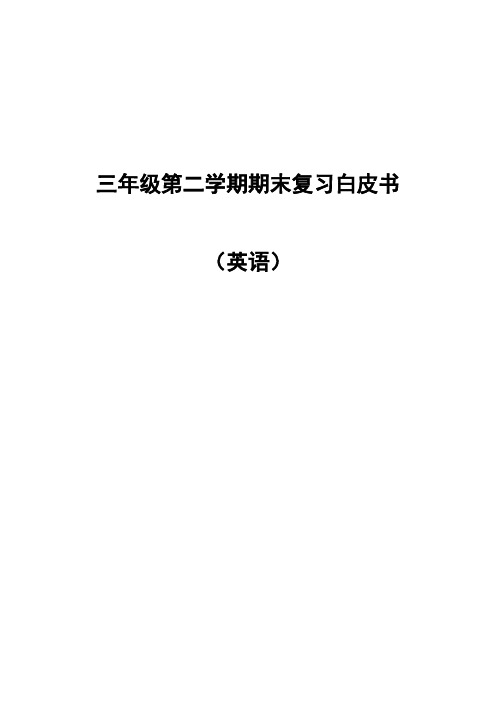
三年级第二学期期末复习白皮书(英语)目录期末各单元知识点复习 (2)各单元重点句型 (12)三年级下学期知识重点总汇 (15)期末真题测试卷(一) (17)期末真题测试卷(二) (22)期末各单元知识点复习第一单元In class在上课【总目标:能使用简单的祈使句表达一些上课的交际用语】一、词汇in class在上课please请open开close关上the这、这个door门sorry对不起come in 进来window窗户rubber橡皮parrot鹦listen to听don’t=do not 不要二、句型及语法1、习惯搭配/短语Good morning,class.早上好,同学们。
Stand up. 起立。
Sit down, please. 请坐。
Open the door. 开门。
Open/close the book 打开/合上书。
Close the window. 关窗。
Look at the blackboard. 看黑板。
Come in. 请进。
Off we go.我们一起走。
I’m sorry. 对不起。
(用于表达歉意)Listen to… 听…Listen to me/him/Liu Tao/the parrot/the teacher...(听我/他/刘涛/鹦鹉/老师...)2、the的用法the是定冠词,用来特指人或事物。
所指的人或事物是同类中特定的一个。
可以和单、复数名词,也可以和不可数名词连用。
例:the apple 这个苹果(许多的苹果中,特指这一个苹果,而不是其他的苹果。
)3、Mr,Miss和Mrs的用法对男士的尊称为Mr… (…先生)Miss 小姐(是对未婚妇女的称呼)Mrs 太太、夫人(是对已婚妇女的称呼)4、询问“这/那是什么?”的句型及其答句What’s this/that ?It’s a/an…5、Don’t引导的祈使句结构:①Don’t + 动词原形+其他Don’t listen to the parrot.不要听鹦鹉的。
六年级学生英语复习提分宝典
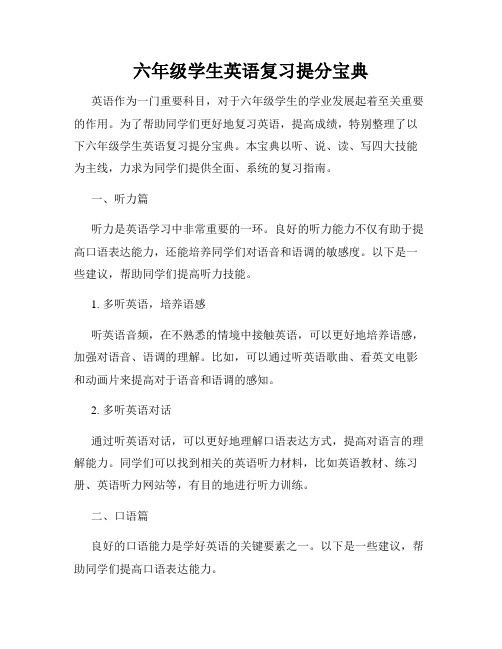
六年级学生英语复习提分宝典英语作为一门重要科目,对于六年级学生的学业发展起着至关重要的作用。
为了帮助同学们更好地复习英语,提高成绩,特别整理了以下六年级学生英语复习提分宝典。
本宝典以听、说、读、写四大技能为主线,力求为同学们提供全面、系统的复习指南。
一、听力篇听力是英语学习中非常重要的一环。
良好的听力能力不仅有助于提高口语表达能力,还能培养同学们对语音和语调的敏感度。
以下是一些建议,帮助同学们提高听力技能。
1. 多听英语,培养语感听英语音频,在不熟悉的情境中接触英语,可以更好地培养语感,加强对语音、语调的理解。
比如,可以通过听英语歌曲、看英文电影和动画片来提高对于语音和语调的感知。
2. 多听英语对话通过听英语对话,可以更好地理解口语表达方式,提高对语言的理解能力。
同学们可以找到相关的英语听力材料,比如英语教材、练习册、英语听力网站等,有目的地进行听力训练。
二、口语篇良好的口语能力是学好英语的关键要素之一。
以下是一些建议,帮助同学们提高口语表达能力。
1. 练习朗读选择一些自己喜欢的英语文章,可以是课文或是英语小故事,按照正确的语音、语速朗读,培养语感和节奏感。
2. 学习口语表达积累常用的口语表达,例如常用的问候语、感谢、道歉和请求等。
通过模仿和练习,熟练运用于日常生活中。
三、阅读篇阅读是提高英语能力的重要途径,通过阅读可以拓宽词汇量、提高文化素养和语言理解能力。
以下是一些建议,帮助同学们提高阅读能力。
1. 阅读有趣的故事和文章选择一些有趣的英语故事和文章,涉及不同主题和领域,帮助同学们培养阅读兴趣。
在阅读过程中,注意理解其中的核心内容及关键词汇。
2. 利用字典和词汇卡片遇到不认识的单词时,及时查阅字典并制作复习卡片。
将复习卡片放在固定时间段进行复习,帮助同学们牢记并巩固单词的意思和用法。
四、写作篇写作是英语学习的重要组成部分,通过写作可以巩固语法知识,锻炼表达能力。
以下是一些建议,帮助同学们提高写作水平。
人教版小学英语3、4、5年级复习资料总复习

人教版小学英语3——5年级复习资料总复习一:学生易错词汇1. a, an的选择: 元音字母开头的单词用an,辅音字母开头的单词用a.2. am , is , are的选择: 单数用is , 复数用are. I 用am , you 用are.3. have , has 的选择: 表示某人有某物。
单数用has , 复数用have.I ,you 用have .4. there is, there are 的选择:表示某地有某物,某人。
单数用there is , 复数用there are.5. some, any 的选择:肯定句用some, 疑问句和否定句用any.6. 疑问词的选择:what (什么) who (谁) where (哪里) whose (谁的) why(为什么)when(什么时候)which(哪一个)how old (多大) how many (多少)how much(多少钱)二:动词现在分词详解动词的ing形式的构成规则:①一般的直接在后面加上ing , 如doing , going , working ,singing , eating②以e 结尾的动词,要先去e再加ing,如having , writing③双写最后一个字母的(此类动词极少)有:running , swimming , sitting , getting三:人称和数人称代词物主代词主格宾格第一人称单数 I(我) me my(我的)复数 we(我们) us our(我们的)第二人称单数 you(你) you your(你的)复数 you(你们) you your(你们的)第三人称单数 he(他) him his(他的)she(她) her her(她的)it(它) it its(它的)复数 they(他们/她们/它们) them their(他们的/她们的/它们的)四:句型专项归类1、肯定句:是指用肯定的语气来陈述的句子,如:I’m a student.She is a doctor. He works in a hospital.There are four fans in our classroom. He will eat lunch at 12:00. I watched TV yesterday evening.2、否定句:含有否定词或表示否定意义词的句子,如:I’m not a student. She is not (isn’t) a doctor.He does not (doesn’t) work in a hospital.There are not (aren’t) four fans in our classroom.He will not (w on’t) eat lunch at 12:00.I did not (didn’t) watch TV yesterday evening.☆注意☆小结:否定句主要是在肯定句的基础上加上了否定词“not”。
小学英语总复习资料完整版

小学英语总复习资料完整版文稿归稿存档编号:[KKUY-KKIO69-OTM243-OLUI129-G00I-FDQS58-小学期间重要词汇:学习用品(school things):pen钢笔pencil铅笔pencil-box铅笔盒ruler尺子book书bag包 schoolbag书包eraser 橡皮 crayon 蜡笔comicbook漫画书postcard明信片newspaper报纸storybook故事书notebook笔记本Chinesebook语文书Englishbook英语书mathbook数学书magazine杂志dictionary词典人体(body):foot脚head头face脸hair头发nose鼻子mouth嘴eye眼睛ear耳朵arm 手臂hand手finger手指leg腿tail尾巴颜色(colours):red红blue蓝yellow黄green绿white白black黑pink粉红purple紫orange橙brown棕动物(animals):cat猫dog狗pig猪duck鸭rabbit兔horse马elephant大象ant蚂蚁fish鱼bird鸟snake蛇mouse老鼠(mice 复数)monkey猴panda熊猫bear熊lion狮子tiger老虎fox狐狸zebra斑马deer鹿giraffe长颈鹿goose鹅hen母鸡turkey火鸡lamb小羊sheep绵羊goat山羊cow奶牛人物(people):friend朋友boy男孩girl女孩mother(mum)母亲father(dad)父亲sister 姐妹brother兄弟uncle叔叔;舅舅aunt姑姑 man男人woman女人Mr.先生Miss小姐lady女士;小姐parents父母grandparents祖父母grandma/grandmother(外)祖母grandpa/grandfather(外)祖父cousin堂(表)兄弟;堂(表)姐妹son儿子daughter女儿baby婴儿kid小孩classmate同学penpal笔友tourist旅行者people人物robot机器人职业(jobs):teacher教师student学生doctor医生nurse护士cook 厨师 driver司机farmer农民singer歌唱家writer作家actor男演员actress女演员artist画家TVreporter电视台记者engineer工程师cleaner清洁工basketballplayer篮球运动员factory worker 工厂工人 postman 邮递员 businessman 商人 post officer 警察fisherman 渔民 scientist 科学家 pilot 飞行员 coach 教练食品,饮料(food&drink):rice米饭bread面包beef牛肉milk牛奶water水egg蛋fish 鱼tofu豆腐cake蛋糕hotdog热狗hamburger汉堡包Frenchfries炸薯条cookie曲奇biscuit饼干jam果酱noodles面条meat肉chicken鸡肉pork猪肉mutton羊肉vegetable蔬菜salad沙拉sandwich 三明治soup汤ice冰ice cream冰淇淋Coke可乐juice果汁tea茶coffee咖啡breakfast早餐lunch午餐dinner/supper晚餐meal一餐水果,蔬菜(fruit&vegetables):apple苹果banana香蕉pear梨orange橙watermelon西瓜grape葡萄eggplant茄子greenbeans青豆tomato西红柿potato土豆peach桃strawberry草莓onion洋葱carrot胡萝卜cabbage卷心菜衣服(clothes):jacket夹克衫shirt衬衫T-shirt丅恤衫skirt短裙子dress连衣裙jeans牛仔裤pants长裤socks袜子shoes鞋子sweater毛衣coat上衣shorts短裤hat(有沿(de))帽子cap便帽sunglasses太阳镜tie领带scarf围巾gloves手套umbrella 雨伞 cloth布交通工具(vehicles):bike自行车bus公共汽车train火车boat小船ship轮船car小汽车taxi出租车plane飞机subway地铁on foot 步行杂物(otherthings):window窗户door门desk课桌chair椅子bed床computer计算机blackboard黑板fan风扇light灯teacher'sdesk讲台picture图画;照片wall墙壁floor地板football/soccer足球phonesofa沙发fridge冰箱table桌子TV电视key钥匙photo照片plate 盘子bowl碗knife刀fork叉spoon勺子chopsticks筷子gift礼物toy玩具key 钥匙 map地图ball球balloon气球kite风筝box盒子umbrella伞violin 小提琴menu菜单e-mail电子邮件trafficlight交通灯money钱medicine药地点(locations):home家room房间bedroom卧室bathroom卫生间livingroom起居室kitchen厨房classroom教室school学校park公园library图书馆postoffice邮局policeoffice警察局hospital医院cinema电影院bookstore书店farm农场zoo动物园办公室library图书馆gym体育馆bathroom卫生间artroom绘画教室computerroom计算机教室musicroom音乐教室TVroom电视机房company公司factory工厂petshop宠物商店naturepark自然公园themepark主题公园sciencemuseum科学博物馆theGreatWall长城supermarket超市 restaurant餐馆bank银行country国家village乡村city城市hometown家乡busstop公交车站课程(classes):Chinese class语文math class数学PE class体育课English class英语课music class 音乐课 art class 美术课国家,城市(countries&cities):China中国America/USA美国UK联合王国England英国Canada加拿大Australia澳大利亚NewYork纽约London伦敦Sydney悉尼Moscow莫斯科气象天气(weather):cold寒冷(de)warm温暖(de)cool凉爽(de) hot 热(de)snowy下雪(de)sunny晴朗(de)rainy下雨(de)windy有风(de)cloudy多云(de)weatherreport天气预报景物(nature):river河流lake湖泊forest森林road公路house房子bridge桥building建筑物rain雨cloud云sun太阳mountain山 hill 小山sky天空rainbow彩虹wind风air空气moon月亮植物(plants):flower花grass草tree树plant植物rose玫瑰leaf叶子星期(week):Monday星期一Tuesday星期二Wednesday星期三Thursday星期四Friday星期五Saturday星期六Sunday星期天weekend周末月份(months):Jan.(January)一月Feb.(February)二月Mar.(March)三月April四月May 五月June六月July七月Aug.(August)八月Sept.(September)九月Oct.(October)十月Nov.(November)十一月Dec.(December)十二月季节(seasons):spring春summer夏fall/autumn秋winter冬方位(directions):south南north北east东west西turn left(at)左边 turn right(at)右边go straight 直走患病(illness):haveafever发烧hurt疼痛haveacold感冒数词(numbers):one一two二three三four四five五six六seven七eight八nine九ten十eleven十一twelve十二thirteen十三fourteen十四fifteen十五sixteen十六seventeen十七eighteen十八nineteen十九twenty二十thirty三十forty四十fifty五十sixty六十seventy七十eighty八十ninety九十forty-two四十二hundred百one/ahundredandthirty-six一百三十六first第一second第二third第三fourth第四fifth第五eighth第八ninth第九twelfth第十二twentieth第二十thirtieth第三十形容词(adj.):big大(de)small小(de)long长(de)tall高(de)short短(de);矮(de)young年轻(de)old旧(de);老(de)strong健壮(de)friendly 有好(de)thin瘦(de)fat胖(de) active积极活跃(de)quiet安静(de)nice好看(de)kind和蔼亲切(de) polite 有礼貌(de) hard-working 工作努力(de) shy 害羞(de)strict严格(de)clever聪明(de)funny滑稽可笑(de)tasty好吃(de)sweet甜(de)salty咸(de)sour酸(de)fresh 新鲜(de) hot 辣(de) delicious 美味(de)favourite最喜爱(de)clean干净(de)tired疲劳(de)angry生气(de) happy高兴(de)sad忧愁(de)good好(de)fine好(de)great很好(de)heavy重(de)new新(de)happy快乐(de)right对(de)hungry饥饿(de)thirsty 渴(de)cute逗人喜爱(de)little小(de)lovely可爱(de)beautiful漂亮(de)colourful色彩鲜艳(de)pretty漂亮(de)cheap便宜(de)expensive昂贵(de)juicy多汁(de)tender嫩(de)healthy健康(de)ill有病(de)helpful有帮助(de)high高(de)easy简单(de)proud骄傲(de)taller更高(de)shorter更矮(de)stronger更强壮(de)older年龄更大(de)younger更年轻(de)bigger更大(de)heavier更重(de)longer更长(de)thinner更瘦(de)smaller更小(de)better更好(de)(good 和well (de)比较急higher更高(de)介词(prep.):in在……里on在……上;在……时候under在……下面near在……(de)旁边behind在……后边nextto与……相邻over在……上面infrontof在……前面above 在……上面 between 在……中间 beside 在旁边动词(v.):get(gets, got) up 起床 go(goes, went) to school去上学 go home 回家go to bed 上床睡觉 wash( washes, washed)my clothes 洗我(de)衣服 watch( watches, watched)TV 看电视 do(does, did) homework 做作业 read(reads, read) books 看书play( plays, played)踢足球 play basketball 打篮球 play ping-pong 打乒乓球play badmiton 打羽毛球 play the pipa 弹琵琶 do kungfu 练功夫 draw(draws, drew) cartoons 画漫画 cook(cooks, cooked)烹饪 swim( swims, swam) go swimming 游泳speak(speaks, spoke) English 说英语 eat(eats, ate) breakfast 吃早饭 have(has, had)…class 上……课 play sports 进行体育运动 do morning exercises 做早操 eat dinner 吃晚饭 clean(cleans, cleaned) my room 打扫我(de)房间 go for a walk 散步go shopping 去购物 take(takes, took) a dancing class 上舞蹈课 go on a picnic去野餐 pick(picks, picked) apples 摘苹果 make(makes, made) a snowman 堆雪人turn(turns, turned) left 向左转 turn right 向右转 slow down 慢下来 stop(stops, stopped)停下 visit(visits, visited) my grandparents 拜访我(de)外祖父母see(sees, saw) a film 看电影 take a trip 去旅行 go to the supermarket 去超市cook Chineses food 做中国菜 study(studies, studied) Chinese 学习中文 do word puzzles 猜字谜 go hiking 去远足see a doctor 看医生 do more exercise 做更多(de)锻炼 wear(wears, wore) warm clothes 穿厚点 take a deep breath 深呼吸 count toslept) 睡觉 go camping 野营 go fishing 去钓鱼 ride(rides, rode) a horse 骑马hurt(hurts, hurt) my foot 伤了脚 take pictures 照相 buy(buys, bought) gifts 买礼物 go cycling 骑自行车 ice-skate = go ice-skating =go skating 滑冰小学期间重要句型特殊疑问句Where are you from 你是哪里人I’m from the UK. 我是英国人.Where is my pencil box 我(de)铅笔盒在哪It’s in your desk. 在你(de)桌子里. Where is it 它在哪It’s near the window. 就在窗户旁边.Where are the keys 钥匙在哪Where is the teachers’ office 教师(de)办公室在哪里It’s on the second floor. 它在二楼.Where is the museum shop 博物馆商店在哪里It’s near the door. 在大门附近. Where are you going 你们打算去哪We’re going to the cinema. 我们打算去电影院. Where does he work 他在哪工作 He works at sea. 他在海上工作.Where did you go 你去了哪里Who’s that man 那位男士是谁He’s my father. 他是我(de)爸爸.Who’s he 他是谁Whose coat is this 这是谁(de)外套It’s mine. 它是我(de).Whose pants are those 那条裤子是谁(de) They are your father’s. 它们是你爸爸(de).Whose is it 这是谁(de) It’s Zhang Peng’s. 是张鹏(de).What’s your/his name 你叫什么名字My/His name’s John. 我叫约翰.What’s this/that 这/那是什么It’s a duck. 它是只鸭子.What are these/those 这些/那些是什么They’re tomatoes.What’s in your schoolbag 你(de)书包里有什么What colour is it 什么颜色(de) It’s blue and white. 是蓝白色(de).What’s for dinner 晚餐吃什么What would you like 你想吃什么I’d li ke (I would like)some soup and bread. 我想要汤和面包. What would you like to eat 你想吃什么 A sandwich, please. 请给我一个三明治. What would you like to drink 你想喝什么I’d like some water. 我想喝点水.What’s your favourite food 你最喜欢吃什么食物Noodles. They’re delicious. 面条.面条很好吃.W hat’s your aunt’s job 你婶婶做什么工作She’s a nurse. 她是为护士.What tiime is it 几点了It’s 6 o’clock. 六点了.What’s the weather like in New York纽约天气怎么样It’s rainy. 是下雨天.What are they doing 他们在干什么They’re eating lunch. 他们在吃午饭. What’s the little monkey doing 那只小猴子在干什么It’s playing with its mother. 它在和妈妈玩耍. What’s he like 他什么样He’s kind. 他很和蔼. What do you have on Thursdays 星期四你有什么课 I have math, English, and music.What can you do for the party, children 孩子们,你们能为联欢会做什么呢I can sing English songs. 我会唱英语歌.What are you going to do tomorrow 你明天打算做什么I’m going to have an art lesson. 我要上美术课.What are Peter’s hobbies 彼得有什么爱好 He likes reading stories. 他喜欢读故事.What does he do 他是做什么(de) He’s a businessman. 他是商人.What’s wrong(with+某人) (某人)怎么了 Your father is ill. 你爸爸病了. What did you do last weekend 你上周末干了什么 What happened 怎么了How are you 你好吗I’m fine, thank you. 我很好,谢谢你.How old are you 你几岁了I’m six years old. 我六岁了.How many plates (你要)几个盘子How many kites do you see 你看见了多少只风筝How many crayons do you have 你有多少只蜡笔How many people are there in your family, Chen Jie 你家有几口人,陈洁My family has six people. 我家有6口人.How do you like this skirt 这条短裙你觉得怎么样It’s very pretty. 它很漂亮. How much is this skirt 这条短裙多少钱It’s $89. 它89美元.How do you come to school 你怎么来学校(de) Usually, I come on foot. 通常我走路来.How does he go to work 他怎么上班 He goes to work by bike. 他骑自行车上班. How tall are you 你多高I’m 1.65 meters. 我身高1.65米.How heavy are you 你多重I’m 48kilograms. 我体重48公斤.How was your weekend 你周末过得怎么样 It was good, thank you. 很好,谢谢.How did you go there 你们怎么去(de) We went there by plane. 我们坐飞机去(de). How do you know that 你怎么知道(de)When is the party 聚会在什么时候It’s in April. 在4月.When is the trip this year 今年(de)秋游在什么时候It’s in October. We’ll go to the Great Wall. 在10月. 我们将去长城.When is April Fool’s Day 愚人节是哪天It’s on April 1st. 它在4月1日.When is your birthday 你(de)生日是哪天 My birthday is on April 4th .When are you going 你们什么时候去When do you finish class in the morning 你们上午(de)课几点结束We finish class at 1 o’clock. 我们1点钟结束上午(de)课.Which season do you like best = What’s your favourite season 你最喜欢(de)季节是什么Winter.= I like winter. =I like winter best. = winter is my favourite season. Why 为什么 Because I like summer vacation. 因为我喜欢暑假.一般疑问句Is she your mother 她是你(de)妈妈吗 Yes, she is. 是(de),她是. No, she isn’t. 不,她不是.Is it in your bag 在你(de)包里吗No, it isn’t. 不,没有在我包里.Is she in the living room 她在客厅里吗No, she isn’t. 不,她不在.Is this the teachers’ office 这是教师办公室吗No, it isn’t. The teachers’ office is next to the library. 不,不是.教师办公室挨着图书馆.Is that the computer room 那是计算机房吗Is it cold 天冷吗No, it isn’t. 不,不冷.Is he young 他年轻吗No, he isn’t. 不,他不年轻.Is he drinking water 它在喝水吗No, he isn’t. He’s eating. 不是.它在吃东西. Is there a river in the forest, Miss White 怀特小姐,森林里有河吗No, there isn’t.不,森林里没有河.Are there any tall buildings in the nature park 自然公园里有高楼吗No, there aren’t. 不,自然公园里没有高楼.Are they on the table 它们在桌子上吗No, they aren’t. They’re in the door. 不,不在.它们在门上.Are these carrots 这些是胡萝卜吗 Yes, they are. 是(de).Are they hens 它们是母鸡吗No, they aren’t. They’re ducks. 不,不是.它们是鸭子.Are these yours 这(双鞋)是你(de)吗No, they aren’t. 不,不是.Are these all ours 这些都是我们(de)吗Can I have some water, please 请给我些水好吗Can I go outside now 现在我能出去吗Yes, you can. / No, you can’t. 可以/不可以.Can I try them on 我能试试吗Can you do any kung fu, Jhon 约翰,你会武术吗 Yes, I can. 是(de),我会武术. Could you see stars at night 在晚上你可以看到星星吗 Yes, I could. 可以.Would you like a knife and fork 你想要刀和叉吗 Yes, please.Do you like oranges 你喜欢橙子吗Yes, I do./ No, I don’t. 是(de),我喜欢./不,我不喜欢.Do you have a library 你们有一个图书馆吗 Yes, we do. 是(de),有.Do you often read books in the park 你经常在这个公园里看书吗No, I don’t. 不, 我不经常在这里看书.Does he live in Sydney 他住在悉尼吗No, he doesn’t. 不,他没有.Does he like doing word puzzles and go hiking 他喜欢猜字谜和远足吗Yes, he does. 是(de),他喜欢.Did you do anything else 你还做了其他什么事吗Yes, I cleaned my room and washed my clothes. 是(de),我到扫了房间,还洗了衣服. Did you see a film 你看电影了吗No, I had a cold. I stayed at home all weekend and slept. 没有,我感冒了.整个周末都待在家睡觉.Did you go to Turpan 你们去吐鲁番了吗Yes, we did./ No, we didn’t. 是(de),我们去了./ 不,我们没去.陈述句It’s so tall 它好高啊 Come here, children 到这里来,孩子们I have a ruler/ an eraser. 我有一把尺子/ 一块橡皮.It has a long nose. 它有长鼻子. It has small eyes and big ears. 它有小眼睛和大耳朵.We have a new classroom. 我们有间新教室.He has glasses and his shoes are blue. 他戴眼镜,穿蓝色(de)鞋子.My family has six people. 我家有6口人.I can use chopsticks. 我会用筷子.It’s time for breakfast/English class. 是时候吃早饭了/上英语课了.It’s time to go home/get up. 是时候回家/起床了.It’s cold outside. 外面冷. It’s rainy. 是下雨天. It’s 26 degrees. 是26度.There is a big bed. (这里)有一张大床.There are so meny pictures here. 这里有这么多幅画.There was no library in my old school. 我以前(de)学校没有图书馆.There were no computers or Internet in my time. 我那时候没有电脑也没有网络. The yellow picture is mine. 那副黄颜色(de)画是我(de).In the USA people on bikes must wear one. 在美国骑自行车(de)人必须戴(头盔 a helmet).I must pay attention to the traffic nights. 我必须注意交通信号灯.We are going to draw some pictures in Renmin Park. 我们要到人民公园去画画. They are afraid of him. 它们害怕它.The cat is angry with them. 这只猫很生它们(de)气.He should see a doctor this morning. 他今天早上应该去看医生.That’s the tallest dinosaur in this hall. 那是这个厅里最高(de)恐龙.It’s taller that both of us together. 它比我俩加起来还高.I want to buy the new film magazine. 我想买期新(de)电影杂志.Before, I was quiet. Now, I’m ver y active in class. 以前,我很安静.现在我在课堂上很活跃.I was short, so I couldn’t ride my bike well. Now, I go cycling every day.我以前个子小,自行车骑不好.现在我天天骑车.I don’t like grapes. 我不欢葡萄.Me, neither. 我也不喜欢.(祈使句)Look at me 看我Have a good time 玩开心点儿Have some bread. 吃点面包吧.Talk quietly. 小声讲话.Keep your desk clean. 保持桌面整洁.Open it and see 打开看看Tell us about your school, please. 请给我们讲讲您(de)学校吧.Let’s go home 我们回家吧Honey, let’s buy some fruit. 宝贝儿, 我们买点水果吧.Let’s go to school 我们一起回家吧Let’s make a puppet (让)我们一起做个木偶吧Let’s go and se e 我们去看看吧Let’s clean the classroom 我们打扫教室吧Let me clean the windows. 我来擦窗户.Don’t go at rhe red light 别闯红灯Don’t be sad. 别伤心.Sounds great 听起来不错Silly me 我真傻时间名词前所用介词(de)速记歌年月周前要用in,日子前面却不行.遇到几号要用on,上午下午又是in.要说某日上下午,用on换in才能行.午夜黄昏须用at,黎明用它也不错.at也用时分前,说“差”可要用上to,说“过”只可使用past,多说多练牢牢记,莫让岁月空蹉跎.小学英语语法复习要点一、名词复数规则1.一般情况下,直接加-s,如:book-books, bag-bags, cat-cats, bed-beds2.以s. x. sh. ch结尾,加-es,如:bus-buses, box-boxes, brush-brushes,watch-watches3.以“辅音字母+y”结尾,变y为i, 再加-es,如:family-families, strawberry-strawberries4.以“f或fe”结尾,变f或fe为v, 再加-es,如:knife-knives5.不规则名词复数:man-men, woman-women, policeman-policemen, policewoman-policewomen, mouse-micechild-childrenfoot-feet,.tooth-teethfish-fish, people-people,Chinese-Chinese, Japanese-Japanese二、一般现在时一般现在时基本用法介绍No. 1一般现在时(de)功能1.表示事物或人物(de)特征、状态.如:The sky is blue.天空是蓝色(de).2.表示经常性或习惯性(de)动作.如:I get up at six every day.我每天六点起床.3.表示客观现实.如:The earth goes around the sun.地球绕着太阳转.一般现在时(de)构成1. be动词:主语+be(am,is,are)+其它.如:I am a boy.我是一个男孩.2.行为动词:主语+行为动词(+其它).如:We study English.我们学习英语.当主语为第三人称单数(he, she,it)时,要在动词后加"-s"或"-es".如:Mary likes Chinese.玛丽喜欢汉语.一般现在时(de)变化1. be动词(de)变化.否定句:主语+ be + not +其它.如:He is not a worker.他不是工人.一般疑问句:Be +主语+其它.如:-Are you a student-Yes. I am. / No, I'm not.特殊疑问句:疑问词+一般疑问句.如:Where is my bike2.行为动词(de)变化.否定句:主语+ don't( doesn't ) +动词原形(+其它).如:I don't like bread.当主语为第三人称单数时,要用doesn't构成否定句.如:He doesn't often play.一般疑问句:Do( Does ) +主语+动词原形+其它.如:- Do you often play football- Yes, I do. / No, I don't.当主语为第三人称单数时,要用does构成一般疑问句.如:- Does she go to work by bike- Yes, she does. / No, she doesn't.特殊疑问句:疑问词+一般疑问句.如:How does your father go to work动词+s(de)变化规则1.一般情况下,直接加-s,如:cook-cooks, milk-milks2.以s. x. sh. ch. o结尾,加-es,如:guess-guesses, wash-washes, watch-watches, go-goes3.以“辅音字母+y”结尾,变y为i, 再加-es,如:study-studies三、现在进行时1.现在进行时表示现在正在进行或发生(de)动作,也可表示当前一段时间内(de)活动或现阶段正在进行(de)动作.2.现在进行时(de)肯定句基本结构为be+动词ing.3.现在进行时(de)否定句在be后加not.4.现在进行时(de)一般疑问句把be动词调到句首.5.现在进行时(de)特殊疑问(de)基本结构为:疑问词不达意 + be + 主语 + 动词ing 但疑问词当主语时其结构为:疑问词不达意 + be + 动词ing动词加ing(de)变化规则1.一般情况下,直接加ing,如:cook-cooking2.以不发音(de)e结尾,去e加ing,如:make-making, taste-tasting3.如果末尾是一个元音字母和一个辅音字母,双写末尾(de)辅音字母,再加ing,如:run-running, stop-stopping四、一般将来时一、概念:表示将要发生(de)动作或存在(de)状态及打算、计划或准备做某事.句中一般有以下时间状语:tomorrow, next day(week, month, year…),soon, the day after tomorrow(后天)等.二、基本结构:①be going to + do;②will+ do.三、否定句:在be动词(am, is, are)后加not或情态动词will后加not成won’t.例如:I’m going to have a picnic this afternoon.→ I’m not going to have a picnic this afternoon.四、一般疑问句: be或will提到句首,some改为any, and改为or,第一二人称互换.例如:We are going to go on an outing this weekend. → Are you going to go on an outing this weekend五、对划线部分提问.一般情况,一般将来时(de)对划线部分有三种情况.1. 问人.Who 例如:I’m going to New York soon. →Who’s going to New York soon.2. 问干什么.What … do.例如: My father is going to watch a race with me this afternoon. →What is your father going to do with you this afternoon.3. 问什么时候.When.例如:She’s going to go to bed at nine. →When is she going to bed六、同义句:be going to = willI am going to go swimming tomorrow(明天). = I will go swimming tomorrow.五、一般过去时1.一般过去时表示过去某个时间发生(de)动作或存在(de)状态,常和表示过去(de)时间状语连用.一般过去时也表示过去经常或反复发生(de)动作感谢.2.Be动词在一般过去时中(de)变化:⑴am 和is在一般过去时中变为was.(was not=wasn’t)⑵are在一般过去时中变为were.(were not=weren’t)⑶带有was或were(de)句子,其否定、疑问(de)变化和is, am, are一样,即否定句在was或were后加not,一般疑问句把was或were调到句首.3.句中没有be动词(de)一般过去时(de)句子否定句:didn’t +动词原形,如:Jim didn’t go home yesterday. 一般疑问句:在句首加did,句子中(de)动词过去式变回原形.如:Did Jim go home yesterday 特殊疑问句:⑴疑问词+did+主语+动词原形如:What did Jim do yesterday⑵疑问词当主语时:疑问词+动词过去式如:Who went to home yesterday动词过去式变化规则:1.一般在动词末尾加-ed,如:pull-pulled, cook-cooked2.结尾是e加d,如:taste-tasted3.末尾只有一个元音字母和一个辅音字母(de)重读闭音节,应双写末尾(de)辅音字母,再加-ed,如:stop-stopped4.以“辅音字母+y”结尾(de),变y为i, 再加-ed,如:study-studied六、形容词和副词(de)比较级复习及练习一、形容词(de)比较级1、形容词比较级在句子中(de)运用:两个事物或人(de)比较用比较级,比较级后面一般带有单词than.比较级前面可以用more, a little 来修饰表示程度.than后(de)人称代词用主格(口语中可用宾格).2.形容词加er(de)规则:⑴一般在词尾加er ;⑵以字母e 结尾,加r ;⑶以一个元音字母和一个辅音字母结尾,应双写末尾(de)辅音字母,再加er ;⑷以“辅音字母+y”结尾,先把y变i,再加er .3.不规则形容词比较级:good,well -better, beautiful-more beautiful七、There be 句型与have, has(de)区别1、There be 句型表示:在某地有某物(或人)2、在there be 句型中,主语是单数,be 动词用is ; 主语是复数,be 动词用are ; 如有几件物品,be 动词根据最靠近be 动词(de)那个名词决定.3、there be 句型(de)否定句在be 动词后加not , 一般疑问句把be 动词调到句首.4、there be句型与have(has) (de)区别:there be 表示在某地有某物(或人);have(has) 表示某人拥有某物.5、some 和any 在there be 句型中(de)运用:some 用于肯定句, any 用于否定句或疑问句.6、and 和or 在there be句型中(de)运用:and 用于肯定句, or 用于否定句或疑问句.7、针对数量提问(de)特殊疑问句(de)基本结构是: How many + 名词复数 + are there + 介词短语 How much + 不可数名词 + is there + 介词短语八、人称代词和物主代词1、人称代词主格和宾格(de)区别:主格通常位于句中第一个动词之前(有时候位于than 之后),宾格一般位于动词或介词之后.2、物主代词形容词性与名词性(de)区别:形容词性用时后面一般要带上名词,名词性则单独使用,后面不带名词.代词用法:主格做主语宾格放在动词和介词后形容词性物主代词能力差,后面需把名词加;名词性物主代词能力好,自己独来又独往.。
(完整版)小学英语毕业总复习资料

小学英语毕业总复习资料有关的词汇人称(I,you…)、动物、交通工具、颜色、家庭成员、日常用品、身体部位、数词、衣服鞋袜、国名、形容词(描述外形特征的词)、动词(表示行为动作的词)、方位介词(前后上下……)主食(饭,面包,面条,蛋糕…)、水果、饮料、疑问词(wh-开头的词语)……话题关于姓名的对话、询问年龄、关于颜色、关于爱好、关于拥有(×××有……)、关于问好、打招呼、关于选择、指向(如:这是……?)、问数量、问来自哪里、问“你在做什么”、问价格、问能力(Can you…)、问出行方式、提出请求(如:May I have…?)、命令与禁止、问是谁、问是谁的、提建议(Let’s…)、问最喜欢的动物是什么以及书上的有关对话等等☆时态☆小学阶段一共学了四种时态,分别是:一般现在时,一般将来时,现在进行时,一般过去时。
句式there be、have got、祈使句和感叹句。
一、国际音标[p] [t] [d] [k] [ɡ] [f] [v] [ʃ] [tʃ] [s] [z] [ʒ] [dʒ] [tr] [dr] [ts] [dz] [θ] [ð] [h] [m] [n] [ŋ] [l] [r] [w] [j] [i:] [e] [æ] [ə:] [ə] [a:] [ʌ] [u:] [u] [ɔ:] [ɔ][ai] [ei] [ɔi] [iə] [ɛə] [uə] [au] [ əu]二、字母1、英语的26个字母中有5个元音字母和一个半元音字母。
2、元音字母:Aa、Ee、Ii、Oo、Uu。
半元音字母:Yy。
3、按照相同元音音素进行归类为:4、字母的大写1)英语中句子第一个词首字母要大写。
2)人名中姓和名的首字母要大写。
3)国家、城市、乡、镇等地名的首字母要大写。
4)民族的首字母要大写。
5)植物或称呼的首字母要大写。
6)专有名词的首字母要大写。
7)表示“我”的单词“I”永远大写。
小学英语四年级下期末复习宝典及答案
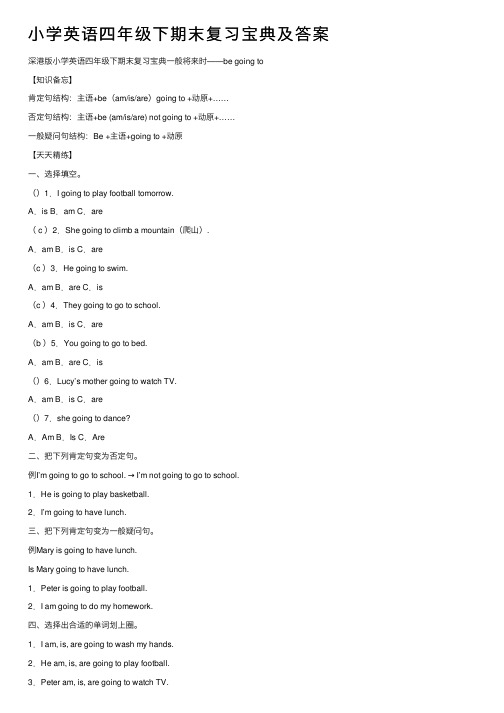
⼩学英语四年级下期末复习宝典及答案深港版⼩学英语四年级下期末复习宝典⼀般将来时——be going to【知识备忘】肯定句结构:主语+be(am/is/are)going to +动原+……否定句结构:主语+be (am/is/are) not going to +动原+……⼀般疑问句结构:Be +主语+going to +动原【天天精练】⼀、选择填空。
()1.I going to play football tomorrow.A.is B.am C.are( c )2.She going to climb a mountain(爬⼭).A.am B.is C.are(c )3.He going to swim.A.am B.are C.is(c )4.They going to go to school.A.am B.is C.are(b )5.You going to go to bed.A.am B.are C.is()6.Lucy’s mother going to watch TV.A.am B.is C.are()7.she going to dance?A.Am B.Is C.Are⼆、把下列肯定句变为否定句。
例I’m going to go to school. → I’m not going to go to school.1.He is going to play basketball.2.I’m going to have lunch.三、把下列肯定句变为⼀般疑问句。
例Mary is going to have lunch.Is Mary going to have lunch.1.Peter is going to play football.2.I am going to do my homework.四、选择出合适的单词划上圈。
1.I am, is, are going to wash my hands.2.He am, is, are going to play football.3.Peter am, is, are going to watch TV.4.We am, is, are going to clean our house.5.They am, is, are going to work.五、把下列句⼦变为⼀般将来时。
PEP小学英语总复习资料(精华版)
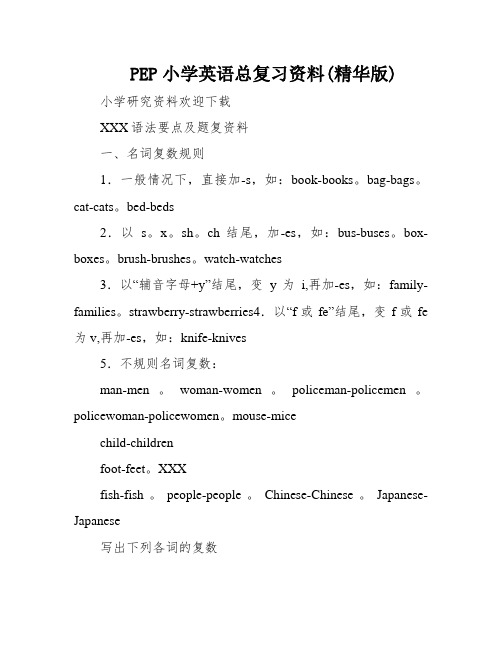
PEP小学英语总复习资料(精华版)小学研究资料欢迎下载XXX语法要点及题复资料一、名词复数规则1.一般情况下,直接加-s,如:book-books。
bag-bags。
cat-cats。
bed-beds2.以s。
x。
sh。
ch结尾,加-es,如:bus-buses。
box-boxes。
brush-brushes。
watch-watches3.以“辅音字母+y”结尾,变y为i,再加-es,如:family-families。
strawberry-strawberries4.以“f或fe”结尾,变f或fe 为v,再加-es,如:knife-knives5.不规则名词复数:man-men。
woman-women。
policeman-policemen。
policewoman-policewomen。
mouse-micechild-childrenfoot-feet。
XXXfish-fish。
people-people。
Chinese-Chinese。
Japanese-Japanese写出下列各词的复数I____him___this_____her______watch______child_______p hoto________diaryday________foot________book_______dress_ _______tooth_______sheepbox_______strawberry_____thief____ peach______sandwich______man______woman____二、一般现在时一般现在时基本用法介绍No。
1】普通目前时的功用1.表示事物或人物的特征、状态。
如:The sky is blue.天空是蓝色的。
2.表示经常性或惯性的动作。
如:I get up at six every day.我每天六点起床。
3.表示客观现实。
如:The earth goes around the sun.地球绕着太阳转。
小学英语复习宝典答案
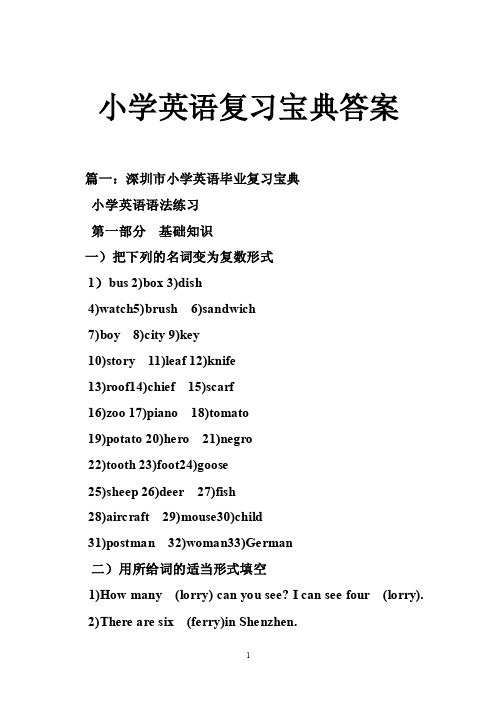
小学英语复习宝典答案篇一:深圳市小学英语毕业复习宝典小学英语语法练习第一部分基础知识一)把下列的名词变为复数形式1)bus 2)box 3)dish4)watch5)brush 6)sandwich7)boy 8)city 9)key10)story 11)leaf 12)knife13)roof14)chief 15)scarf16)zoo 17)piano 18)tomato19)potato 20)hero 21)negro22)tooth 23)foot24)goose25)sheep 26)deer 27)fish28)aircraft 29)mouse30)child31)postman 32)woman33)German二)用所给词的适当形式填空1)How many (lorry) can you see? I can see four (lorry).2)There are six (ferry)in Shenzhen.3)There are many (sheep) and (deer) on the grass.4)Canada, America, Italy and Russia are all foreign (country).5)In the street there are many big (mouse).6)Mr Zhang and Liu are both (postman).7)Mark and David are are (German).8)We are (Chinese). They are (Japanese).9)China has many large (city). Shanghai is one of thebiggest (city) in China.10)Hello, Mr Wang. How many (child) do you have?I have one (child).11)I like listening to (story).12)How many (family) are there in the village? Thereare 99.13)How many (time) did you go to Shenzhen museum?14)I want to buy some (milk)and (vegetable).15)There is much (rubbish) on the floor.16)How many (kilo) of apples do you want?17)In Autumn, there are lots of (leaf) fall.18)I like (potato). But I don’t like (tomato).19)Here is an ox. There are three (ox) over there.20)I’m too thirsty. Please give me two (glass) of drink.One is tea. The oth(转载于: 小龙文档网:小学英语复习宝典答案)er is juice.三)把下列名词的数量译成英语1)一块肉2)一瓶水3)一盒牛奶4)一碗汤5)一则新闻6)一张纸7)两斤牛肉8)两瓶油9)三杯果汁10)四包巧克力11)两公斤猪肉12)两盆水四)用名词所有格的适当形式填空1)This is(Kate) book. That is(Tim) pencilcase.2)My(parents) clothes are hanging in the wardrobe.3)He is a friend of my(father).4)It’s(Lily and Lucy) new house.5)Whose are these dolls? They are(Pat).6) My(mother) and(sister) dresses arecheap.7) The light bedroom is light.8)The entrance supermarket is the first floor.9)The key the door is lost.10)The answer this question is very easy.一)用冠词填空(不填的打×)1)Hello, T om, let’s go toschool. OK, let’sgo.2)Look, what is he doing? He is eating apple.3)Look atugly girl. She is T om’s sister.4)There iscat under the table. There isdog behind the door.5) old ,man is my father. He isdoctor..6) China isbig country.7) USA is big country, too.8)I sawbird, butbird is yellow.9)I sawold man. old man was T om’sgrandpa.10)I like playingpiano. Billy likes playingfootball.11)This islargest supermarket in the city.12) Sunday is the first day of a week.13)This is picture.There ishouse inpicture.house is besidebus.There isold man in front ofhouse.14)Can you playvolleyball well?15) Chongqi is the largest city in China.二)选择填空1)I want to behonest student.A.aB.anC.theD.×2)There isart room in our school.A.aB.anC.theD.×3)This is“f”. It’s in “life”.A.aB.anC.theD.×4)I sawold man in the street.A.aB.anC.theD.×5)Billy isEnglish teacher. He isgood teacher.A.a,anB.an,aC.an,anD.the,a6)Let’s go out forwalk.A.aB.anC.theD.×7)The park is very far. It will take ushour to get there.A.aB.anC.theD.×8)Monkey King isfamous story. And it is interesting story.A.the,theB.an,anC.an,aD.a,an9) sun isstar. It is bright and huge.A.aB.anC.theD.×10)I knowold man. old man is T om’s grandpa.篇二:小学英语四年级下期末复习宝典及答案深港版小学英语四年级下期末复习宝典一般将来时——be going to【知识备忘】肯定句结构:主语+be(am/is/are)going to +动原+…… 否定句结构:主语+be (am/is/are) not going to +动原+…… 一般疑问句结构:Be +主语+going to +动原【天天精练】一、选择填空。
人教PEP版英语三年级下册Recycle1必备复习宝典知识点总结+巩固练习+答案含答案
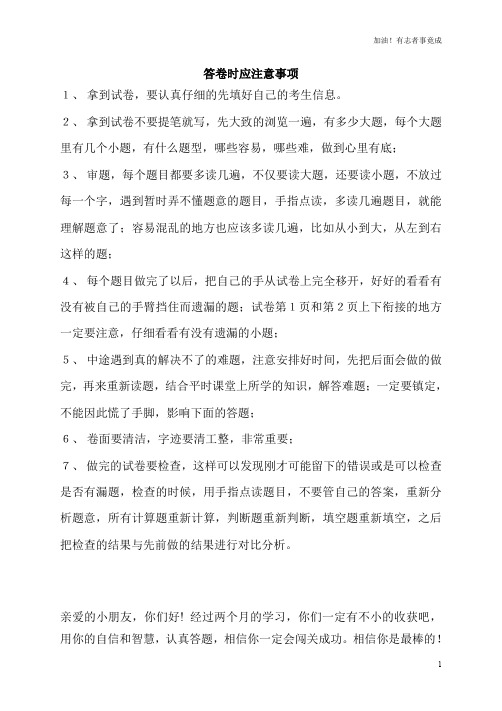
加油!有志者事竟成答卷时应注意事项1、拿到试卷,要认真仔细的先填好自己的考生信息。
2、拿到试卷不要提笔就写,先大致的浏览一遍,有多少大题,每个大题里有几个小题,有什么题型,哪些容易,哪些难,做到心里有底;3、审题,每个题目都要多读几遍,不仅要读大题,还要读小题,不放过每一个字,遇到暂时弄不懂题意的题目,手指点读,多读几遍题目,就能理解题意了;容易混乱的地方也应该多读几遍,比如从小到大,从左到右这样的题;4、每个题目做完了以后,把自己的手从试卷上完全移开,好好的看看有没有被自己的手臂挡住而遗漏的题;试卷第1页和第2页上下衔接的地方一定要注意,仔细看看有没有遗漏的小题;5、中途遇到真的解决不了的难题,注意安排好时间,先把后面会做的做完,再来重新读题,结合平时课堂上所学的知识,解答难题;一定要镇定,不能因此慌了手脚,影响下面的答题;6、卷面要清洁,字迹要清工整,非常重要;7、做完的试卷要检查,这样可以发现刚才可能留下的错误或是可以检查是否有漏题,检查的时候,用手指点读题目,不要管自己的答案,重新分析题意,所有计算题重新计算,判断题重新判断,填空题重新填空,之后把检查的结果与先前做的结果进行对比分析。
亲爱的小朋友,你们好! 经过两个月的学习,你们一定有不小的收获吧,用你的自信和智慧,认真答题,相信你一定会闯关成功。
相信你是最棒的!1Recycle 1一、单词【拓展单词】little /lɪtl/小的baby /'beɪbɪ/宝贝,婴儿sport /spɔ:t/运动act /ækt/表演out /aʊt/出来二、词组1.act it out 表演出来2.a little bit 一点点三、句子1.You are small and fast.你又小又快。
2.You are a little bit fat.你有一点点胖。
3.Your tail is not.你的尾巴不是(那样的)。
一、看图,选出与图片相符合的句子。
小学英语最全学习资料

小学英语史上最全最实用最好复习资料一、小学英语词汇汇总1、3A1.Animals (动物)dog 狗cat 猫monkey 猴子tiger 老虎panda 熊猫zebra 斑马bird鸟elephant 象2.Fruit (水果) apple 苹果orange 橘子banana 香蕉pear梨peach 桃子mango 芒果pineapple 菠萝watermelon 西瓜3.Clothing items (衣物类)coat 外套;大衣jacket 茄克衫;短上衣sweater 毛衣;(厚)运动服blouse (女式)衬衫dress 连衣裙;晚礼服skirt 短裙shirt 衬衫TshirtT恤衫4.Food and drinks (食物和饮料)cake 蛋糕hamburger 汉堡egg 蛋;鸡蛋ice—cream冰淇淋coffee 咖啡tea 茶;茶叶milk 牛奶juice 果汁5.Colours (颜色)red 红色;红色的green 绿色white 白色black 黑色yellow 黄色blue蓝色orange桔黄色brown棕色;褐色6.Things for school (学校用品)book 书pen 钢笔pencil 铅笔ball pen 圆珠笔pencil box文具盒pencil sharpener 卷笔刀rubber 橡皮ruler 尺7。
Vehicles(交通工具)car 小汽车bike 自行车bus 公共汽车plane 飞机8。
Places (场所)zoo 动物园park 公__________园cinema 电影院supermarket 超市the Great Wall长城9。
People(人物)man 人;男人woman 妇女boy 男孩girl 女孩10.Things in a room(房内物品)bed 床table 桌子chair 椅子fridge 冰箱bookcase 书橱desk 书桌sofa 沙发telephone 电话light 电灯TV 电视机door 门window窗子Walkman随身听box 盒子basket 篮子tap水龙头2、3B1、Family members(家庭成员)father父亲mother 母亲grandfather祖父grandmother祖母aunt姨妈;舅母uncle 伯父;舅父brother/son 兄;弟/儿子sister/daughter 姐;妹/女儿2、Clothing items (衣物)cap 便帽hat 帽子tie 领带vest 背心belt 皮带trousers(复数)长裤shoe 鞋sock 袜子3、Things for school (学校用品) storybook 故事书copybook 抄写本knife 小刀tape修正带;胶带crayon 蜡笔school bag 书包stapler 订书机4、Things in a room (室内物品)clock 闹钟computer 电脑radio 收音机camera 照相机watch 手表toy train 玩具火车key 钥匙5、Musical instrument(乐器)piano 钢琴violin 小提琴guitar 吉他accordion 手风琴6、Sports (体育运动)football 足球basketball 篮球volleyball 排球baseball 棒球swimming 游泳skating 滑冰climbing 爬山skiing 滑雪fishing 钓鱼jogging 慢跑running 跑rowing 划船7、Food and drinks(饮食)hot dog 热狗sandwich 三明治pie 馅饼bread 面包rice 米饭softdrinks清凉饮料chocolate 巧克力milk 牛奶8、Rooms (房间)sitting-room 起居室dining-room 餐厅bedroom 卧室bathroom 舆洗室study 书房kitchen 厨房3、4Aa pen一支钢笔a dog一条狗a key一把钥匙a ball pen一支圆珠笔a tiger一支老虎apurse一个钱包a pencil一支铅笔a fan一把扇子a storybook一本故事书a book 一本书acat一只猫a tape一个修正带a car 一辆小汽车a bike 一辆自行车a kite 一个风筝abus一辆公共汽车a ruler一把尺a rubber一块橡皮a pencil case一个铅笔袋a tiger一只老虎a panda一只熊猫a desk一张课桌a shop一家商店a pair of shoes 一双鞋子a sweater 一件毛衣a jacket 一件茄克衫big 大的small 小的long 长的short 短的one 一two 二three 三four 四five 五six 六seven七eight八nine 九ten 十eat 吃drink 喝write 写read 读close 关、闭open 打开tired 疲劳的、累的ill 有病的cold 冷的hungry饥饿的thirsty渴的4、4Ba student 一个学生a teacher 一个老师a doctor 一个医生a nurse 一个护士a boy 一个男孩a girl 一个女孩a man 一个男人a woman 一个女人new 新的grandfather (外)祖父grandmother (外)祖母father 父亲mother 母亲brother 兄弟sister 姐妹an eye 一只眼睛a mouth一张嘴white白色的a skirt一条短裙a friend一个朋友a policeman一个警察apolicewoman一个女警察a waiter一个男服务员a waitress一个女服务员a driver 一个司机aworker一个工人an engineer一位工程师a farmer 一个农民a postman一个邮递员acook一个厨师apples苹果an apple一只苹果oranges桔子an orange一只桔子bananas香蕉abanana一只香蕉peaches桃子a peach一只桃子grapes葡萄a grape一粒葡萄watermelons西瓜a watermelon一个西瓜pears梨 a pear一只梨some一些astation一个车站a hospital一家医院a supermarket一家超级市场by train坐火车by plane坐飞机by taxi坐出租汽车on foot步行please请chip油炸土豆条noodle面条sweet糖果chocolate巧克力tea茶coffee咖啡juice汁液a pie 一个馅饼a chair一张椅子ablackboard一块黑板a computer一台计算机a picture一张图画a bookcase一个书架(橱) anoffice一个办公室a playground一片操场a classroom一个教室our我们的a knife一把刀aplate一个盘子a glass一个玻璃杯a cup一个杯子a bottle一个瓶子a table一张桌子afridge一只冰箱an egg一个蛋(不可数名词) bread面包rice米;米饭5、5Aday(一)天;白天all所有的;全部a reading room一间阅览室sure有把握的floor(楼房的)层;地面;地板a garden一个花园a house 一间房子a flower一朵花live居住;生活a study一个书房a bedroom一间卧室large大的beside在……旁边;靠近 awall一面墙between在……中间;在(两者)之间a bed一张床under在……下面behind在……后面a door一扇门a lesson 一课a song一首歌sing唱,唱歌dance跳舞play演奏learn学,学会listen听swim游泳make 做,制造ride骑(马、自行车) put放,摆can能a family一个家庭things东西、物品a vase一个花瓶a horse一只马a chicken一只鸡a duck一只鸭子apig一只猪evenings晚上need需要work工作,劳动a candle 一支蜡烛morning 早晨,上午ring(铃、钟等)响sweep扫,扫除Maths数学sleep睡觉run 跑,奔跑walk步行,散步jump 跳跃say说chess棋laugh笑,大笑a newspaper一张报纸class课,(学校里的)班perhaps可能a tent一个帐篷a pot一只锅a towel一条毛巾a hill一座小山children孩子们,儿童fat胖的thin瘦的show出示,给……看over结束a square一个正方形a star一个星形、星形物us我们(宾格)fly飞、放(风筝、飞机模型等)art艺术、美术teach教、教书the moon月亮paper纸a heart一个心、心形物a shape一个形状a circle一个圆圈the sun太阳help…with帮助… wash clothes洗衣服6、5BMonday 星期一Tuesday 星期二Wednesday星期三Thursday星期四Friday星期五aweek一星期(周)Chinese 汉语、中文、中国人Science 科学、自然科学Computer Studies计算机课程English 英语、英国的、英国人的a subject 一门学科(科目)interesting 有趣的a headache 头疼 a cough 咳嗽a fever 发烧a cold 伤风lunch 午餐speak说,讲(同义词:say) bad 坏的、严重的(反义词:good)get 变得、购买feel感觉、觉得now 现在a stamp 一张邮票 a coin 一个硬币a ship 一艘船an animal 一只动物a classmate一位同班同学collect收集beautiful 美丽的、漂亮的hobbies(复数) 业余爱好collectstamps 收集邮票collect coins 收集硬币go shopping 去购物take photos 拍照makeclothes做衣服an e—mail 一封电子邮件write an e—mail写一封电子邮件a town 一个城镇busy 忙(碌)的age 年龄usually 通常well 好fast 快的,快地high 高的,高地run fast跑得快jump high 跳得高time时间,次left左right右stop停止touch触摸,接触anarm一只手臂a hand一只手a leg一条腿a foot一只脚a face一张脸agame一个游戏,一次比赛half半,一半night夜,夜间on duty值日past过a quarter一刻钟,四分之一quick快的(地)ready准备好的really真正地,确实talk谈话,讲话spend度过weekend周末very很,非常learn…from…向…学习sport 体育运用often经常,常常of course当然catch抓住,捉住an ant一只蚂蚁a bee一只蜜蜂a butterfly一只蝴蝶a visitor一位参观者,一位来访者UK英国,联合王国visit参观,访问British英国人the Great Wall长城USA美国American美国人Japan日本Japanese日本人,日语France法国French法国人,法语7、6Astop停止mean意思是,意指should应当,应该must必须,应当shouldn’t=should not不应当litter乱丢杂物park停放(汽车)danger危险March三月April四月May 五月June六月July七月when什么时候,何时ago 以前as作为,当做ago 以前moment瞬间,片刻a date一个日期a birthday一个生日a present 一份礼物excited激动的,兴奋的exciting令人激动的,令人兴奋的a race一次竞赛plant种植milk挤;牛奶a cow 一头母牛taste品尝pull up把…向上拔a festival一个节日a gate一扇大门answer回答;答复ask问;请求people人;人们last最近刚过去的;最后的infront of 在…前面take photos拍照look for寻找just now刚才(a moment ago) pullup把…向上拔have a good time过得愉快Children’s Day儿童节National Day国庆节SpringFestival春节New Year’s Day元旦8、6Bthan 比young年轻的old年老的heavy 重的light 轻的tall高的strong 强壮的low低fish鱼,钓鱼slow慢late晚stop停车站along沿着street街、街道postoffice邮局weather天气spring春季summer夏季hot热的autumn秋季cold冷的winter 冬季plan计划,打算picnic野餐play(戏剧的)演出be good at善长于turn left向左转turn right向右转post office邮局get on 上车get off下车take part in参加…参与… write a letter写(一封)信penfriend 笔友also也glue胶水二、小学英语短语汇总a new student 一个新学生a new teacher一个新老师I'm new here。
2023年六年级上册英语复习宝典
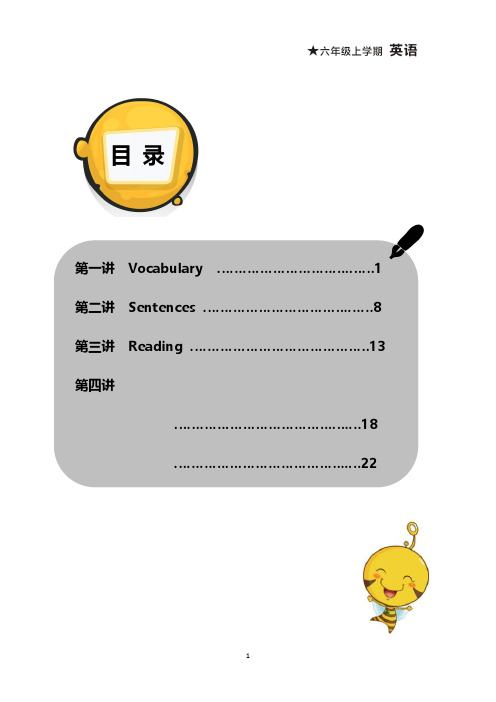
第一讲Vocabulary (1)第二讲Sentences …………………………….……8第三讲Reading (13)第四讲 练习练习一 ............................................18练习二 .. (22)目录词汇小测一、听录音,选出你所听到的单词,将序号填在题前的括号里。
()1.left first right west ()2.plan land plant fun ()3.club cute corn cut ()4.check back dark trick ()5.place peace nice once二、听录音,为下列图片排序。
()()()()()()三、听句子,选出正确的选项,将序号填在题前的括号里。
()1.Science is my favourite_____.A.classB.subjectC.book()2.London is the_____of the UK.A.capitalB.cityC.heart()3.When do you usually_____?A.go to sleepB.go homeC.go to school ()4.People around the_____love pandas.A.villageB.countryC.world英语第一讲Vocabularyonpast from of with in()5.My best friend _____Brazil.A.goes toes fromC.likes四、在字母群中圈出你学过的单词并写在横线上。
1.__________2.__________3.__________4.__________5.__________五、英汉对对碰(连线)。
A.此刻,目前B.互相C.看一看D.种植玉米E.喂鱼1.each other2.plant corn3.have a look4.feed fish5.at the moment六、为下列单词选择正确的图片。
小学英语复习总资料(已整理)
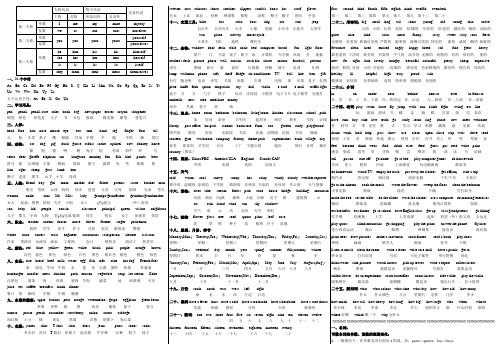
一、26个字母Aa Bb Cc Dd Ee Ff Gg Hh Ii Jj Kk Ll Mm Nn Oo Pp Qq Rr Ss TtUu Vv Ww Xx Yy Zz五个元音字母:Aa Ee Ii Oo Uu二、学习用品:pen pencil pencil-case ruler book bag newspaper eraser crayon sharpener钢笔铅笔铅笔盒尺子书书包报纸橡皮擦蜡笔卷笔刀三、人体:head face hair nose mouth eye ear arm hand leg finger foot tail头脸头发鼻子嘴眼睛耳朵手臂手腿手指脚尾巴四、动物:cat dog pig duck goose rabbit snake squirrel cow donkey horse猫狗猪鸭鹅兔子蛇松鼠奶牛驴马zebra deer giraffe elephant ant kangaroo monkey fox fish bird panda bear斑马鹿长颈鹿大象蚂蚁袋鼠猴子狐狸鱼鸟熊猫熊lion tiger sheep goat lamb hen狮子老虎绵羊山羊小羊母鸡五、人物:friend boy girl mom mother dad father parents sister brother man朋友男孩女孩妈妈母亲爸爸父亲父母姐妹兄弟男人woman uncle aunt Mr Miss lady grandpa/grandfather grandma/grandmother 女人叔叔;舅舅姑姑先生小姐女士(外)祖父(外)祖母son baby kid people cousin classmate principal queen visitor neighbour 儿子婴儿小孩人物堂(表)兄弟/姐妹同学校长女王参观者邻居六、职业:teacher student doctor nurse driver farmer singer policeman教师学生医生护士司机农民歌唱家警察writer actor actress artist engineer accountant salesperson cleaner assistant作家男演员女演员画家工程师会计销售员清洁工售货员七、颜色:red blue yellow green white black pink purple orange brown红色蓝色黄色绿色白色黑色粉红色紫色橙色棕色八、食品:rice bread beef milk water egg fish tofu cake hot dog French fries米面包牛肉牛奶水蛋鱼豆腐蛋糕热狗炸薯条hamburger noodles meat chicken pork mutton vegetable soup ice-cream Coke汉堡包面条肉鸡肉猪肉羊肉蔬菜汤冰淇淋可乐juice tea coffee breakfast lunch dinner果汁茶咖啡早餐午餐晚餐九、水果和蔬菜:apple banana pear orange watermelon grape eggplant green beans苹果香蕉梨橙西瓜葡萄茄子青豆tomato potato peach cucumber strawberry onion carrot cabbage西红柿土豆桃黄瓜草莓洋葱胡萝卜卷心菜十、衣服:jacket shirt T-shirt skirt dress jeans pants shoes socks夹克衫衬衫T-恤衫短裙子连衣裙牛仔裤长裤鞋子袜子sweater coat raincoat shorts sneakers slippers sandals boots hat scarf gloves毛衣上衣雨衣短裤网球鞋拖鞋凉鞋靴子帽子围巾手套十一、交通工具:bike bus train boat ship car taxi jeep自行车公共汽车火车小船轮船小汽车出租车吉普车van plane subway motor cycle小货车飞机地铁摩托车十二、杂物:window door desk table chair bed computer board fan light floor窗户门书桌桌子椅子床计算机写字板风扇灯地板teacher's desk picture photo wall curtain trash bin closet mirror football present讲台图画相片墙窗帘垃圾箱壁橱镜子足球礼物lamp walkman phone sofa shelf fridge air-conditioner TV ball kite box gift台灯随身听电话沙发书架冰箱空调电视球风筝盒子礼物plate knife fork spoon chopsticks toy doll violin e-card e-mail traffic light盘子刀叉勺子筷子玩具洋娃娃小提琴电子卡片电子邮件交通灯umbrella nest tube medicine money雨伞鸟巢管子药钱十三、地点:home room bedroom bathroom living room kitchen classroom school park家房间卧室卫生间起居室厨房教室学校公园library post office hospital cinema bookstore farm zoo garden study playground图书馆邮局医院电影院书店农场动物园花园书房操场canteen gym washroom company factory theme park supermarket bank village city食堂体育馆卫生间公司工厂主题公园超市银行乡村城市country(国家)十四、国家:China/PRC America/USA England Canada/CAN中国美国英国加拿大十五、天气:cold warm cool snowy sunny hot rainy windy cloudy weather reporter寒冷的温暖的凉爽的下雪的晴朗的炎热的下雨的有风的多云的天气预报十六、景物:river lake stream forest path raod house bridge building mountain河流湖泊河;溪森林小道公路房子桥建筑物山air rain cloud wind sun sky rainbow空气雨云风太阳天空彩虹十七、植物: flower grass tree seed sprout plant leaf rose花草树种子苗植物叶子玫瑰十八、星期、月份、季节:Monday(Mon.) Tuesday(Tue.) Wednesday(Wed.) Thursday(Thu.) Friday(Fri.) Saturday(Sat.)星期一星期二星期三星期四星期五星期六Sunday(Sun.) weekend day month year spring summer fall(autumn) winter星期日周末日月年春夏秋冬January(Jan.) February(Feb.) March(Mar.) April(Apr.) May June July August(Aug.)一月二月三月四月五月六月七月八月September(Sept.) October(Oct.) November(Nov.) December(Dec.)九月十月十一月十二月十九、方位: south north east west left right南北东西左边右边二十、患病:have a fever hurt have a cold have a toothache have a headache have a sore throat发烧疼痛感冒牙疼头疼喉咙疼二十一、数词: one two three four five six seven eight nine ten eleven twelve一二三四五六七八九十十一十二thirteen fourteen fifteen sixteen seventeen eighteen nineteen twenty十三十四十五十六十七十八十九二十first second third fourth fifth eighth ninth twelfth twentieth第一第二第三第四第五第八第九第十二第二十二十二、形容词:big small long tall short young old strong thin active大的小的长的高的短/矮的年轻的旧/老的健壮的瘦的活跃的quiet nice kind strict smart funny tasty sweet salty sour fresh安静的好看的和蔼可亲的严格的聪明的滑稽可笑的好吃的甜的咸的酸的新鲜的favourite clean tired excited angry happy bored sad fine great heavy最喜爱的干净的疲劳的兴奋的生气的高兴的无聊的忧愁的好的很好的重的new fat right little lovely hungry beautiful colourful pretty cheap expensive新的胖的对的小的可爱的饥饿的漂亮的色彩鲜艳的漂亮的便宜的昂贵的healthy ill helpful high easy proud sick健康的有病的有帮助的高的简单的骄傲的有病的二十三、介词:in on under near behind next to over in front to在…里在…上在…下面在…的旁边在…后边与…相邻在…上面在…前面二十四、动词: play swim skate fly jump walk run climb fight swing eat like玩游泳滑冰飞跳走跑爬打架荡吃喜欢have turn buy take live teach go study learn sing dance row meet welcome有转弯买带居住教去学习学习唱歌跳舞划见面欢迎thank work look help pass show use clean open close stop wait drive send谢谢工作看帮助传递展示使用打扫打开关上停等驾驶寄feel become think wear find drink taste feed guess put read write paint感觉变成思考穿寻找喝尝喂养猜放读写绘画tell put on take off go home go to bed play computer games do housework告诉穿上脱掉回家上床睡觉玩电脑游戏做家务do homework watch TV empty the trash put away the clothes get off(on) take a trip做作业看电视倒垃圾收拾衣服下车/下车去旅行go to the cinema cook the meals water the flowers sweep the floor clean the bedroom去看电影做饭浇花扫地打扫卧室make the bed set the table do the dishes wash the clothes use a computer do morning exercises铺床摆饭桌洗碗碟洗衣服使用计算机晨练eat breakfast eat dinner go to school have English class get up visit grandparents go hiking吃早餐吃晚餐上学上英语课起床看望(外)祖父母去远足play sports climb mountains go shopping play the piano answer the phone fly kites进行体育运动爬山购物弹钢琴接电话放风筝plant trees draw pictures make a snowman cook dinner read a book play chess种树画画堆雪人做饭看书下棋listen to music clean the room write a letter write an e-mail have a picnic get to听音乐打扫房间写信写电子邮件举行野餐到达drink water take pictures watch insects pick up leaves write a report collect insect喝水照相观察昆虫采摘树叶写报告收集昆虫collect leaves do an experiment catch butterflies count insects ride a bike play the violin收集树叶做实验捉蝴蝶数昆虫骑自行车拉小提琴二十五、疑问词: what what colour what time what day how how old how many什么什么颜色几点星期几怎样几岁多少how much how tall how heavy how long how big how large who when whose多少钱多高多重多长多大面积多大谁什么时候谁的where在哪which哪一个why为什么一、名词:可数名词的单数、复数的规则变化:1.一般情况下,在单数名词后面加-s构成。
六年级英语上册复习宝典
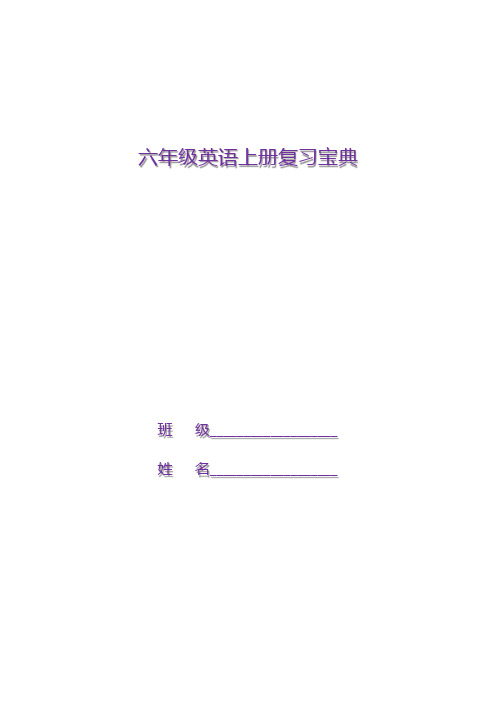
六年级英语上册复习宝典班级___________________ 姓名___________________六年级英语上册期末复习宝典Unit1一、重点词汇短语1. grow up长大2. in Photo 1 在照片1中(注意图片本身的内容用in)3. a primary school student 一名小学生4. junior high school初中=middle school5. look around向四周看look after照顾look for寻找look at…看…look up 查找6. was/were born出生(born前用be的过去式)7. catch flies抓苍蝇(注意用复数表示一类事物)8. two months old两个月大(用于be动词后)=two-month-old(用于名词前)9. tall and pretty又高又美10. a round head一个圆圆的脑袋11. cute 可爱的handsome英俊的二. 重点语法一般过去时:be动词过去式的用法am/is-----was are---were (重难点)结构:主语+was/were +其他Unit 2一、重点词汇和短语1.summer holiday暑假; winter holiday寒假2.the Great Wall长城(注意the及大写)3. the Palace Museum故宫博物院(注意the及大写)4. Tian'anmen Square天安门广场(注意没有the及大写)5. go to the beach去海边6. play ball games 玩球类游戏( 球类前不加the,如football,basketball,volleyball等)7. How about+名词/动词ing?=What about+名词/动词ing? …怎么样?8. take a lot of photos拍了很多照片(注意take过去式took,photo复数)9. during the summer holiday在暑假期间10. in August在八月(月份前用in)11. go back to the UK返回英国(注意英国缩略词前用the)12. have a good time玩得开心=enjoy oneself=have fun13. stay with sb.跟某人待在一起14. in the countryside在乡村15. last Sunday上周日(last...是一般过去时标志)16. How is...? …怎么样?二. 重点语法一般过去时:含有be 动词的一般疑问句,否定句和特殊疑问句am/is-----was are---were (重难点)结构:Was/Were +主语+其他?主语+was/were not+其他.特殊疑问词+一般疑问句?Unit3一、词汇短语1. this morning今天早上(一般是过去时标志)2. two hamburgers两个汉堡3. some cola一些可乐4. --What did you have for breakfast?(注意介词for)--I had…for breakfast.5. should应该,情态动词,后加动词原形6. have a little meat / sweet food 吃一点肉/甜食(注意a little修饰不可数名词)7. have too much meat吃太多肉(注意too much修饰不可数名词)8. have breakfast 吃早餐9. healthy ---unhealthy (un否定前缀=not)10. strong and healthy 健康又强壮11. play sports 做运动12. fat and unhealthy 又胖又不健康13. have poor/good eating habits 有不好/好的饮食习惯14. fish and chips 炸鱼薯条15. in the UK 在英国16. 可数:hamburger; vegetable; egg; pie; sandwich; noodle;不可数: cola; fruit; meat; bread; milk; pizza; rice; fish;chicken; sweet food; candy; ice-cream; chocolate;17.肯:I had breakfast this morning.否:I didn’t have breakfast this morning.一般疑问句:Did you have breakfast this morning?肯定/否定回答:Yes, I did./ No, I didn’t.二. 重点语法一般过去时:含有实意动词的动词过去式:直去双改特殊记结构:主语+V过去式+其他Did+主语+V原+其他?特殊疑问词+一般疑问句?Unit41. last weekend上周末2. play with...和...玩(play with Tom/fire)3. the Greens(格林一家)the+姓氏的复数表一家人4. the US=the USA=America美国5. play chess下棋6. in my home在我家(in表示在房子范围内,at表示在家这地点)7. the UK英国8. play table tennis=play ping-pong ball打乒乓球9. be from=come from来自10. in the forest在森林11. in the tree落在树上on the tree长在树上12. make a lot of noise制造很多噪音13. stop doing sth.停止干什么14. dig a hole挖一个洞15. have a good sleep睡个好觉16. talk to sb.跟某人说话17. say hello to sb.跟某人打招呼18. know...well很了解......本单元重点句型:1.学会用Did you…?询问对方过去是否做了某事?2.学会Yes, I did./ No, I didn’t.做肯定或否定回答Unit51. in danger 处于危险中2. in the past 在过去(一般过去时的时间标志)3. in the wild 在野生环境中4. South China tigers 华南虎5. blue whale 蓝鲸6. six hundred 六百(区别:hundreds of)7. on one‘s way home 在某人回家的路上on one’s way to school 在某人去学校的路上8. take care of=look after 照顾9. go for a walk 去散步10. drive...away 把...赶走11. grow up 长大12. learn a lot 学到很多(区别:a lot of +名词)13. send (sent)...back to ... 把...送回到...14. three years later三年后(整篇文章是过去时,则用于过去时)15. be happy to do sth. 很高兴做某事...16. help them all 帮助他们所有人17. in the jungle 在丛林中18. oo发音:k,d之前oo短,food foot恰相反19. What can we do to help them? 我们能帮助他们做些什么?本单元重点句型:学会用in the past, there were…句型描述某种事物过去的数量。
(完整版)小学三-六年级英语总复习资料

(完整版)小学三-六年级英语总复习资料预览说明:预览图片所展示的格式为文档的源格式展示,下载源文件没有水印,内容可编辑和复制小学英语知识点总结PEP三—六年级英语单词汇总三年级上册英语单词ruler 尺子pencil 铅笔eraser 橡皮crayon 蜡笔bag 包pen 钢笔pencil box 铅笔盒book 书no 不your 你(们)的red 红色的green 绿色的yellow 黄色的blue 蓝色的black 黑色的brown 棕色的white 白色的orange 橙色的face 脸ear 耳朵eye 眼睛nose鼻子mouth 嘴arm 胳膊hand 手head 头body 身体leg 腿foot 脚duck 鸭子pig 猪cat 猫bear 熊dog 狗elephant 大象monkey 猴子bird 鸟tiger 老虎panda 熊猫zoo 动物园funny 滑稽的bread 面包juice 果汁egg 鸡蛋milk 牛奶water 水cake 蛋糕fish 鱼rice 米饭one 一two 二three 三four 四five 五six 六seven 七eight 八nine 九ten 十plate 盘子三年级下册英语单词Canada 加拿大USA 美国China 中国she 她student 学生pupil 小学生he 他teacher 教师boy 男孩and 和girl 女孩new 新的friend 朋友today 今天father 爸爸man 男人woman 女人mother 妈妈sister 姐妹brother 兄弟grandmother (外)祖母grandma 口语(外)祖母grandfather (外)祖父grandpa 口语(外)祖父family 家庭thin 瘦的fat 胖的tall 高的short 矮的,短的long 长的small 小的big 大的giraffe 长颈鹿so 这么,那么children (child的复数)儿童tail 尾巴on 在……上in 在……里under 在……下面chair 椅子desk 桌子cap 帽子ball 球car 小汽车boat 小船map 地图toy 玩具box 盒;箱pear 梨apple 苹果orange 橙子banana 香蕉watermelon 西瓜strawberry 草莓grape 葡萄buy 买fruit 水果eleven 十一twelve 十二thirteen 十三fourteen 十四fifteen 十五sixteen 十六seventeen 十七eighteen 十八nineteen 十九twenty 二十kite 风筝beautiful 美丽的四年级上册英语单词classroom 教室window 窗户blackboard 黑板light 电灯picture 图画door 门fan 风扇teacher’s desk讲台computer 计算机wall 墙壁floor 地板really 真的near 距离近TV 电视clean 打扫help 帮助schoolbag 书包maths book数学书English book 英语书Chinese book 语文书storybook 故事书candy 糖果notebook 笔记本key 钥匙lost 丢失so much 非常的cute 可爱的strong 强壮的friendly 友好的quiet 安静的hair 头发shoe 鞋glasses 眼镜his 他的or 或者right 对的hat 帽子her 她的bedroom 卧室living 客厅study 书房kitchen 厨房bathroom 浴室bed 床 phone 电话table 桌子sofa 长沙发fridge 冰箱find 找到them 他们beef 牛肉chicken 鸡肉noodles 面条soup汤vegetable 蔬菜chopsticks 筷子bowl 碗fork 餐叉knife 刀(复数knives)spoon 勺dinner 晚餐ready 准备好help yourself 为自己取用pass 给;递try 尝试parents 父母cousin 同辈表亲或堂亲uncle 舅父;叔父;伯父;姨夫aunt 姑母;姨母baby婴儿小弟弟doctor 医生cook 厨师driver 司机farmer 农民nurse 护士people 人们but 但是little 小的puppy 小狗football player 足球运动员job 工作basketball 篮球四年级下册英语单词first 一楼second 二楼teachers’office 教师办公室library 图书馆playground 操场computer room 计算机室art room 美术教室music room 音乐教师next to 紧挨着homework 作业class 班级forty 四十way 方向breakfast 早餐English class 英语课lunch 午饭music class 音乐课PE class 体育课dinner 正餐get up 起床go home 回家go to school 去上学go to bed上床睡觉over 结束now 现在o’clock ……点钟kid 小孩thirty 三十hurry 快点come on 快;加油just a minute 稍等一会儿cold 寒冷的cool 凉的warm暖和的hot热的sunny晴朗的windy多风的cloudy多云的snowy 下雪的rainy多雨的outside 在户外be careful 小心weather 天气New York 纽约how about ……怎么样degree 度数world 世界London伦敦Moscow 莫斯科Singapore新加坡Sydney 悉尼fly 放love 爱你的tomato 西红柿potato 土豆green beans 豆角carrot 胡萝卜horse 马cow 奶牛sheep绵羊hen母鸡these这些animal动物those那些garden 花园farm农场goat 山羊eat 吃clothes 衣服pants 裤子hat 帽子dress 连衣裙skirt 女裙coat 外衣sweater毛衣sock短袜shorts短裤jacket 夹克衫shirt衬衫yours你的;你们的whose谁的mine 我的pack 收拾wait 等待glove 手套scarf 围巾umbrella 伞sunglasses 太阳镜pretty美观的expensive昂贵的cheap 便宜的nice好的try on试穿size尺码of course当然too太just正好how much多少钱eighty八十dollar美元sale大减价more更多的us我们五年级上册英语单词old老的young年轻的funny可笑的kind慈祥的strict严厉的polite有礼貌的helpful 有用的hard-working工作努力的clever聪明的shy羞怯的know知道our我们的Ms女士will将要sometimes有时robot机器人him他speak会说finish完成Monday星期一Tuesday星期二Wednesday 星期三Thursday 星期四Friday 星期五Saturday 星期六Sunday 星期日weekend 周末wash my clothes 洗我的衣服watch TV看电视do homework 做作业read books 看书 play football 踢足球 cooking 烹饪often 常常park 公园tired疲倦的play sports 做体育运动should 应该every 每一个day一天schedule工作计划salad 沙拉sandwich 三明治hamburger汉堡包ice cream冰激凌tea茶fresh新鲜的healthy健康的delicious美味的hot辣的sweet甜的drink 喝thirsty 渴的favourite特别喜爱的food 食物dear亲爱的onion洋葱sing English songs 唱英文歌曲play the pipa弹琵琶do kung fu练武术dance跳舞draw cartoons画漫画cook 烹饪swim 游泳play basketball打篮球party聚会play ping-pong打乒乓球speak English说英语we’ll=we will我们将next下一个的learn学习wonderful极好的any任何的no problem没问题want想要send发送;邮寄email电子邮件clock 时钟plant 植物water bottle水瓶bike自行车photo照片in front of在……前面between在……中间above在……上面beside在旁边behind在……后面there表示存在grandparents祖父母their他们的lots of许多flower花move搬家dirty肮脏的mouse老鼠everywhere 到处live居住nature大自然forest森林river河;江lake湖泊mountain高山bridge桥hill小山tree树木building建筑物village村庄house房子go boating去划船aren’t=are not不是rabbit兔子high高的say说have a look看一看五年级下册英语单词eat breakfast 吃早饭have…class 上…课do morning exercises 做早操eat dinner 吃晚饭clean my room打扫我的房间go for a walk 散步go shopping购物take a dancing class 上舞蹈课when什么时候after在(时间)后start开始usually通常地Spain西班牙late迟a.m.上午p.m.下午why为什么shop买东西work工作last上一个的sound听起来好像also还;也busy忙的need需要play戏剧letter信live居住island岛always一直cave山洞win获胜spring 春天summer 夏天autumn 秋天winter 冬天season 季节go on a picnic 去野餐pick apples 摘苹果make a snowman 堆雪人go swimming 去游泳which哪一个best最snow雪good job做得好because因为vacation假期all 完全pink粉色lovely可爱的fall落下;秋天leaf(复数leaves)叶子paint用颜料绘画January一月February二月March三月April四月May五月June六月July七月August 八月September九月October十月November十一月December十二月a few一些thing 事情sports meet运动会Easter 复活节trip旅行year年plant种植contest比赛the Great Wall长城National Day国庆节game游戏American美国的Thanksgiving感恩节Christmas 圣诞节holiday假日roll滚动look for寻找RSVP请赐复chocolate巧克力bunny兔子by在……之前first(1st)第一second(2nd)第二third(3rd)第三fourth(4th)第四fifth (5th)第五twelfth(12th)第十二sure当然twentieth(20th)第二十twenty-first(21st)第二十一twenty-second(22nd)第二十二twenty-third(23rd)第二十三thirtieth(30th)第三十special 特殊的fool傻瓜kitten小猫diary日记still仍然noise声音;噪音fur 浓密的软毛open开着的walk行走mine 我的yours你(们)的his 他的hers她的theirs他们的ours我们的climbing(正在)攀爬eating (正在)吃playing (正在)玩耍jumping (正在)跳drinking (正在)喝 sleeping(正在)睡觉each other相互excited 兴奋的like像……那样bamboo竹子its他的doing morning exercises(正在)做早操having…class(正在)上…课talk quietly 小声讲话reading a book(正在)看书listening to music(正在)听音乐keep to the right 靠右keep your desk clean保持你的课桌干净takes turns按顺序来show给人看anything 任何事物else另外exhibition展览sushi寿司teach教Canadian加拿大的Spanish西班牙的六年级上册英语单词science 科学museum博物馆post office邮局bookstore书店cinema电影院hospital 医院crossing 十字路口turn left 左转弯turn right 右转弯ask 问sir 先生interesting 有趣的Italian意大利的restaurant餐馆pizza 比萨饼street街道get到达gave提供feature特点GPS全球定位系统follow跟着far较远的tell告诉on foot步行by乘Scotland苏格兰plane飞机taxi出租车ship船subway地铁train火车slow down 慢下来stop停下Mrs夫人early早到的helmet头盔must必须wear 戴pay attention to注意traffic lights交通信号灯Munich慕尼黑Germany德国Alaska阿拉斯加州sled雪橇fast快的ferry轮渡bus 公共汽车Papa Westray帕帕韦斯特雷岛visit拜访see a film看电影take a trip去旅行supermarket超市evening晚上tonight在今晚tomorrow明天next week下周dictionary 词典word book单词书comic book连环画册postcard明信片lesson课space太空travel 旅行half一半price价格Mid-Autumn Festival中秋节get together 聚会mooncake 月饼poem诗moon月亮study学习puzzle谜hiking远足pen pal笔友hobby业余爱好jasmine茉莉idea主意shall征求意见Canberra堪培拉amazing令人惊奇的goal射门join 加入club俱乐部share分享worker工人factory工厂postman邮递员businessman商人police officer警察fisherman渔民coach教练scientist科学家country 国家head teacher校长sea大海stay保持university大学if如果gym体育馆reporter 记者use使用type打字quickly迅速地secretary秘书angry生气的afraid害怕sad难过的worried担心的happy高兴地see a doctor看病wear穿more更多的take a deep breath深吸一口气count to ten数到十chase追赶mice老鼠(mouse的复数)bad坏的hurt受伤ill有病wrong有毛病should应该feel感觉well健康sit坐grass草坪hear 听见ant蚂蚁worry担心stuck陷住mud泥pull拉everyone 每人六年级下册英语单词younger 更年轻的older 更年长的taller 更高的shorter 更矮的;更短的longer 更长的thinner 更瘦的heavier 更重的bigger 更大的smaller 更小的stronger 更强壮的dinosaur 恐龙hall 大厅metre米(美语:meter )than 比both 两个都kilogram 千克;公斤countryside 乡村lower 更低的shadow 阴影;影子smarter 更聪明的become 开始变得;变成cleaned (clean 的过去式)打扫stayed (stay 的过去式)停留;待washed (wash 的过去式)洗watched (watch 的过去式)看had (have 的过去式)患病;得病had a cold 感冒slept (sleep 的过去式)睡觉read (read 的过去式)读saw (see 的过去式)看见last 最近的;上一个的yesterday 昨天before 在……之前drank (drink 的过去式)喝show 演出magazine 杂志better (well 的比较级)更好的faster (fast 的比较级)更快的hotel 旅馆fixed (fix 的过去式)修理broken 破损的lamp 台灯loud 喧闹的;大声的enjoy 享受……乐趣;喜爱stay 暂住;停留went (go 的过去式)去camp 野营went camping (尤指在假日)野营fish 钓鱼;捕鱼went fishing 去钓鱼rode (ride 的过去式)骑(马;自行车) hurt (hurt 的过去式) (使)受伤ate (eat 的过去式)吃took (take 的过去式)拍照took pictures 照相bought (buy 的过去式)买gift 礼物fell (fell 的过去式)摔倒off 从(某处)落下Labour Day 劳动节mule 骡子Turpan吐鲁番could (can 的过去式)能till 直到beach 海滩;沙滩basket 篮;筐part 角色licked (lick 的过去式)舔laughed (laugh 的过去式)笑dining hall 饭厅grass 草坪gym 体育馆ago 以前cycling 骑自行车运动(或活动)go cycling 去骑自行车ice-skate 滑冰badminton 羽毛球运动star 星easy 容易的look up (在词典中或通过电脑)查阅Internet 互联网different 不同的active 积极的;活跃的race 赛跑nothing 没有什么thought (think 的过去式)想felt (feel 的过去式)感觉cheetah 猎豹trip 绊倒woke (wake 的过去式)醒dream 梦词汇分类总结1、介词About 关于;大约to 到…去;对,给by 乘…at 在…时;在…of…的for 为;给with 和…一起;用,以after 在…之后without 没有,不,无from 从,来自in在…里面on在…上面under在…下面after在…之后up向上off 从,离开before 在…之前down 沿着;沿…向下between 在两者之间beside 在…旁边behind 在…后面inside在…的里面near 在…附近till 直到…才along 沿着2、代词人称代词物主代词指示代词疑问代词What (什么)who (谁,主格)which (哪一个)whose (谁的)whom(谁,宾格)不定代词some一些any任何both两者都each每个,各自many许多much许多few 极少数little极少量3、连词but但是and和so所以if如果than比because因为4、近义词(组)pretty-beautiful-nice ill-sick study-learn gift-present begin-startago-before near-beside-next to big-large want-would likeOK-all right finish-over enjoy ourselves-have a good time no-not5、反义词(组)open-close put on-take off left-right tall-short long-shorthot-cold big-small behind-in front of good-bad cheap-expensive fat-thin heavy-light old-young on-under ask-answer come-go day-night noisy-quiet active-quiet start-finish free-busy early-late clever-silly before-after right-wrong fast-slow full-hungry full-empty up-down warm-cool same-different easy-difficult sad-happy then-nownew-old6、同音词no-know by-buy too-two-to see-sea meet-meat hear-here aunt-ant son-sun wear-where be-bee there-their right-write I-eye read(过去式)-red whose-who’s new-knew(know的过去式)week-weak cent(美分)-sent(send的过去式)句型总结1、人物(people)Who’s this…?Who are they?2、职业(jobs)What does your… do?What’s your…?3、食品、饮料(food&drink)4、水果、蔬菜(fruit &vegetables)What’s your favourite…?Do you like…?I like…I don’t like…What would you like? I’d like some…What do you have for…today?5、交通工具(vehicles)How do you go to…?How did you go there?How are they going to…?6、杂物(other things)地点(locations)景物(nature)介词(prep.)There is a/a n… There are...Is there a/an…? Are there…?7、课程(classes)What do yo u have on…?8、气象(weather)What’s the weather like in…?9、星期(week)月份(months)季节(seasons)What day is it today? When is your birthday? What’s the date?Which season do you like best?What’s your favou rite season?10、方位(directions)Where is the…?11、患病(illness)What’s the matter? What’s wrong with you?How are you feeling now?Are you feeling better now?There is something wrong with my leg.12、数词(numbers)How old /tall/heavy are you?When do you…?How many…can you see?How many… do you have?How many people are there in your family?How much is it/this/that…?How much are they?13、形容词(adj.)How are you? What’s he like?14、代词(pron.)动词(v.)What did you do?What are you doing?What are you going to do?What do you do on Saturdays/Sundays/the weekend? What can you do?What is your hobby?When did you …?When are you going ?When is your birthday?How did you do?How are you doing?How are you going to do?How do you …?How does he/she…?How are you?How tall/old/heavy are you?Where did yo u …?Where are you going ?Where is…?一般疑问句及其肯否定回答肯定回答否定回答Are you…? Yes, I am. No, I’m not.Are you..? Yes, we are. No, we aren’t.Is he…? Yes, he is. No, he isn’t.Is she…? Yes, she is. No, she isn’t.Is it…?Yes, it is. No, it isn’t.Are they…? Yes, they are. No, they aren’t.肯定回答否定回答Do you…? Yes, I do. No, I don’t.Do you..? Yes, we do. No, we don’t. Does he…? Yes, he does.No, he doesn’t. Does she…? Yes, she does. No, she doesn’t. Does it…?Yes, it does. No, it doesn’t. Do they…? Yes, t hey do. No, they don’t.肯定回答否定回答Did you…? Yes, I did. No, I didn’t. Did you..? Yes, we did. No, we didn’t. Did he…? Yes, he did. No, he didn’t. Did she…? Yes, she did. No, she didn’t. Did it…?Yes, it did. No, it didn’t. Did they…? Yes, they did. No, they didn’t.语法总结一、动词的时态1、现在进行时:表示说话人说话时正在进行的动作。
小学英语总复习资料完整版

小学英语总复习资料完整版作为小学英语的学习者,我们在学习过程中需要不断地回顾和复习已经学过的知识,以便更好地掌握英语。
本文档将为大家提供一份小学英语总复习资料完整版,希望对大家的学习有所帮助。
一、语音练习学好英语首先要从语音练习做起,下面是重点音的练习。
1./æ/音(发音形似“爱”):cat(猫)、hat(帽子)、apple(苹果)2./ɔ:/音(发音形似“奥”):fork(叉子)、dog(狗)、door(门)3./ɒ/音(发音形似“哦”):box(盒子)、pot(锅)、doll(洋娃娃)4./e/音(发音形似“阿”):bed(床)、pen(钢笔)、egg(鸡蛋)5./ʌ/音(发音形似“啊”):sun(太阳)、umbrella(雨伞)、bus(公共汽车)6./ə/音(发音形似“额”):sofa(沙发)、banana(香蕉)、camera(相机)7./i:/音(发音形似“以”):sheep(绵羊)、tea(茶)、tree(树)8./u:/音(发音形似“优”):screwdriver(螺丝刀)、shoe(鞋)、moon(月亮)二、基础语法1.名词:名词分为可数名词和不可数名词。
常见的可数名词有:book(书)、apple(苹果)、desk(桌子)等;不可数名词有:water(水)、rice(米)等。
2.动词:动词分为实义动词和系动词。
实义动词如:play(玩)、eat(吃)等;系动词如:be(是)、feel(感觉)等。
3.时态:时态分为一般现在时、一般过去时和一般将来时。
一般现在时的句型为:主语+动词原形+其他;一般过去时的句型为:主语+动词过去式+其他;一般将来时的句型为:主语+will+动词原形+其他。
4.数量:数量包括基数词和序数词。
基数词如:one(一)、two(二)等;序数词如:first(第一)、second(第二)等。
5.代词:代词分为人称代词、物主代词和指示代词。
人称代词如:I(我)、you(你)等;物主代词如:my(我的)、your(你的)等;指示代词如:this(这个)、that(那个)等。
四年级第二学期期末复习宝典-英语
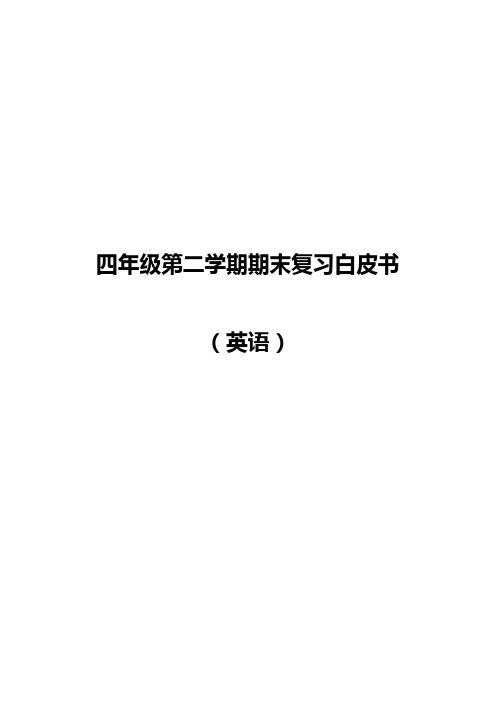
四年级第二学期期末复习白皮书(英语)目录期末各单元知识点复习 (1)四年级下学期期末真题卷(一) (17)四年级下学期期末真题卷(二) (21)四年级下学期期末单元知识点提要Unit1一、短语1.our new timetable我们的新课表2.like Chinese 喜欢语文3.like Maths喜欢数学4.like English喜欢英语5.go to the playground去操场6.what lessons什么课7.what subjects什么课程(科目) 8.this morning今天早上9.this afternoon今天下午10.don’t skate不滑冰11.make a cake做一个蛋糕e and make a cake过来做一个蛋糕13.our school subjects我们的学校课程14.at school 在学校二、句子1. Welcome back to school. 欢迎回校。
2. Nice to see you. 见到你很高兴。
3. What about you? 你呢?4. It’s fun. 有趣。
5. It’s time for PE. 该上体育课了。
6. A:What subjects do you like? 你喜欢什么科目?B:I like Art and Music. 我喜欢美术和音乐。
7. A:What lessons do we have this morning?我们上午有什么课?B:We have English, Chinese, and Maths.我们有英语、语文和数学。
e and make a cake.过来做一个蛋糕。
9. They like Music. We all like English.他们喜欢音乐。
我们都喜欢英语。
三、语法1. welcome back to school (school前不加任何冠词)go to schoolgo to the playground2. Nice to see you too. (too放在最后)3. our new timetable (人称词放前面,表示新旧的放后面)4. 学科类名词首字母大写例如:Chinese, English…5. subject 和lesson的区别:学科;课程你喜欢什么学科;我最喜欢的学科是…-------subject今天/ 一周有些什么课程/ 几节课------lesson6. it's time for +名词It's time for school.it's time to +动词It's time to go to school.7. What about...?问另一个人的情况,回答句根据问的人之前所讲的内容来决定。
- 1、下载文档前请自行甄别文档内容的完整性,平台不提供额外的编辑、内容补充、找答案等附加服务。
- 2、"仅部分预览"的文档,不可在线预览部分如存在完整性等问题,可反馈申请退款(可完整预览的文档不适用该条件!)。
- 3、如文档侵犯您的权益,请联系客服反馈,我们会尽快为您处理(人工客服工作时间:9:00-18:30)。
两种物主代词的不同用法
名词性物主代词应单独使用,后面不跟名词
1 This is my book.
The book is mine.
mine = my book 2 That is her bike.
The bike is hers. hers = her bike
小结:形容词性物主代词+名词=名词性物主代词
don't— do not wasn't —was not weren't —were not
let's—let us he's —he is\was we'll — we will
who's —who is I'd— I would that's —that is
词形变化集锦
speak(名词)——speech real(副词)——really
人称代词主格在句中作主语,位于动词前。 I am a teacher. You like music. He is playing football.
人称代词宾格在句中作宾语,位于动词后(介词 后)。
Give me an orange, please. These apples are for them.
复数 ourselves yourselves themselves
形式
-self(单数) -selves(复数)
构成
物主代词+-self / -selves 第一、二人称
wind(形容词)——windy
knife(复数)——knives
happy(名词)——happiness
one(序数词)——first three(序数词)——third
two(序数词)——secend sheep(复数)——sheep
knife(复数)——knives tomato(复数)——tomatoes
反义词集锦1
fat — thin well — badlly laugh — cry
sad — happy up — down sit — stand often—sometimes same —different clean — dirty why — because fast— slow sorry— thank lovely — naughty stay— leave heavy — light long — short good — bad tall — short
his her its his hers its
第一 第二 第三 人称 人称 人称
our your their
ours yours theirs
两种物主代词的不同用法:
1)形容词性物主代词用来修饰后面的名词,不能单独应用:
This is my book. That is her bike.
小结:形容词性物主代词+名词
物主代词
形容词性 名词性
物主代词
表示“我的”、“你的”、
物主代词: “他的”、“她的”、“它
的”、“我们的”、“你们 的”、“他们的”等的词。
形容词性物主代词和名词性物 主代词
数
单数
复数
人 第 一 第二 名 称 人 称 人称 称
主形词格容性 my your
名
宾词格 mine yours
格性
第三 人称
3 -- Whose pen is it? Is it Mike’s?
-- Yes, it is _h_is__. (he)
【粉墨登场】
• 英语中共有八个反身代词,在使用时应注意和 它所指的相应的对象在人称、性别、数上保持 一致。其基本形式如下表所示:
第一人称 第二人称
第三人称
单数
myself
yourself himself herself itself
friend(形容词)——friendly wind(形容词)——windy
sun(形容词)——sunny rain(形容词)——rainy
noice(形容词)——noisy luck(形容词)——lucky
cloud(形容词)——cloudy care(形容词)——careful
actor(动词)——act
反义词集锦2
wrong — right come — go always —never on — under\off white — black dry — wet dark — bright start — finish hot — cold cool — warm east — west south — north old —new\young big — small
I — eye
aren't — aunt
who's —whose pear— pair see —sea
全称集锦
can't— can not aren't — are not it's — it is
I'm t — is not
no— know right — write they're —they are
同音词集锦
passed — past sent— cent too — two\to our — hour where — wear
son — sun
ate — eight meet —meat
no— know right — write hear —here
for — four T — tea
buy — bye\by there — their
代词
代词的种类
主格
人称代词
宾格
代
词 形容词性
物主代词
名词性
人称代词主格和宾格
数
单数
复数
人 第 一 第二 第三 第一 第二 第三 格 称 人 称 人称 人称 人称 人称 人称
he
主格
I
you
she it
宾格
me
him
you her
it
we you they us you them
人称代词主格和宾格的区别:
根据句意,用括号中所给代词的 适当形式填空。
1 -- Is this _h_e_r_ watch? -- No, it is not _h_e_rs_. (she)
2 -- There are two rulers on the desk.
Which one is y_o_u_r_s ? (you) -- _M_y__ ruler is red. The red one is _m_i_n_e. (I)
